

High School Essay
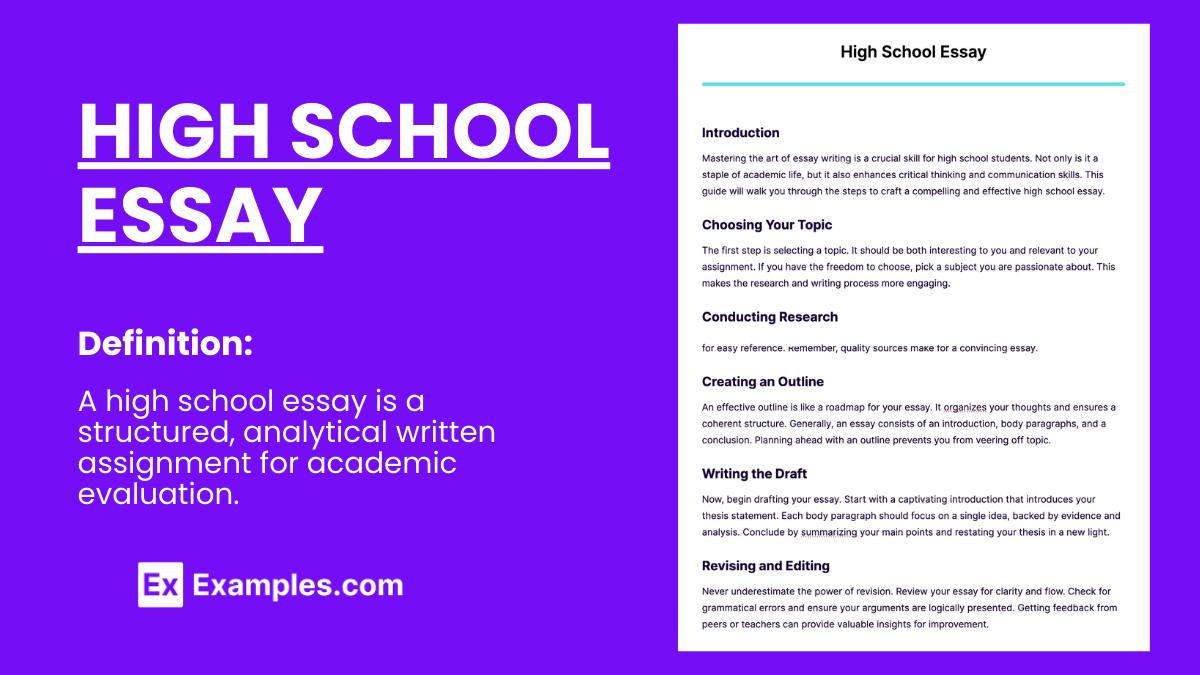
Navigating the complexities of High School Essay writing can be a challenging yet rewarding experience. Our guide, infused with diverse essay examples , is designed to simplify this journey for students. High school essays are a crucial part of academic development, allowing students to express their thoughts, arguments, and creativity. With our examples, students learn to structure their essays effectively, develop strong thesis statements, and convey their ideas with clarity and confidence, paving the way for academic success.
What Is a High School Essay? A high school essay is anything that falls between a literary piece that teachers would ask their students to write. It could be anything like an expository essay , informative essay , or a descriptive essay . High school essay is just a broad term that is used to describe anything that high school student writes, probably in subjects like English Grammar or Literature.
It is a good way to practice every student’s writing skills in writing which they might find useful when they reach college. Others might even be inspired to continue writing and take courses that are related to it.
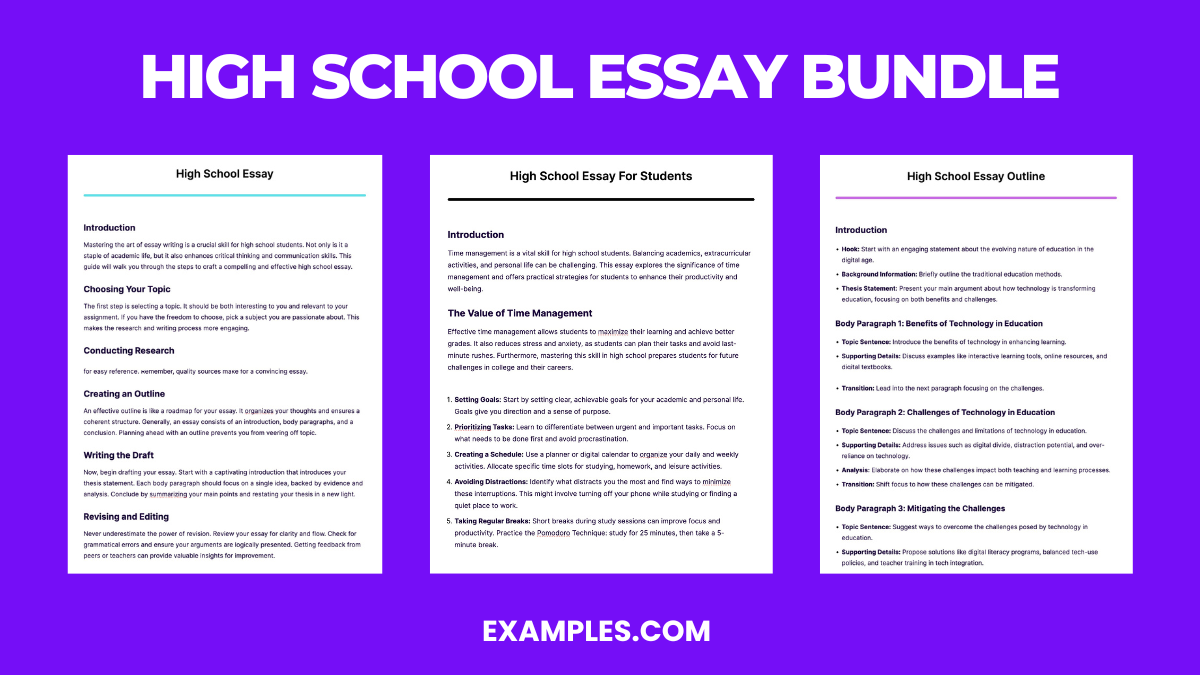
Download High School Essay Bundle
When you are in high school, it is definite that you are expected to do some write-ups and projects which require pen and paper. Yes. You heard that right. Your teachers are going to let you write a lot of things starting from short stories to other things like expository essays. However, do not be intimidated nor fear the things that I have just said. It is but a normal part of being a student to write things. Well, take it from me. As far as I can recall, I may have written about a hundred essays during my entire high school years or maybe more. You may also see what are the parts of an essay?
High School Essay Format
1. introduction.
Hook: Start with an engaging sentence to capture the reader’s interest. This could be a question, a quote, a surprising fact, or a bold statement related to your topic. Background Information: Provide some background information on your topic to help readers understand the context of your essay. Thesis Statement: End the introduction with a clear thesis statement that outlines your main argument or point of view. This statement guides the direction of your entire essay.
2. Body Paragraphs
Topic Sentence: Start each body paragraph with a topic sentence that introduces the main idea of the paragraph, supporting your thesis statement. Supporting Details: Include evidence, examples, facts, and quotes to support the main idea of each paragraph. Make sure to explain how these details relate to your topic sentence and thesis statement. Analysis: Provide your analysis or interpretation of the evidence and how it supports your argument. Be clear and concise in explaining your reasoning. Transition: Use transition words or phrases to smoothly move from one idea to the next, maintaining the flow of your essay.
3. Conclusion
Summary: Begin your conclusion by restating your thesis in a new way, summarizing the main points of your body paragraphs without introducing new information. Final Thoughts: End your essay with a strong closing statement. This could be a reflection on the significance of your argument, a call to action, or a rhetorical question to leave the reader thinking.
Example of High School Essay
Community service plays a pivotal role in fostering empathy, building character, and enhancing societal well-being. It offers a platform for young individuals to contribute positively to society while gaining valuable life experiences. This essay explores the significance of community service and its impact on both individuals and communities. Introduction Community service, an altruistic activity performed for the betterment of society, is a cornerstone for personal growth and societal improvement. It not only addresses societal needs but also cultivates essential virtues in volunteers. Through community service, high school students can develop a sense of responsibility, a commitment to altruism, and an understanding of their role in the community. Personal Development Firstly, community service significantly contributes to personal development. Volunteering helps students acquire new skills, such as teamwork, communication, and problem-solving. For instance, organizing a local food drive can teach students project management skills and the importance of collaboration. Moreover, community service provides insights into one’s passions and career interests, guiding them towards fulfilling future endeavors. Social Impact Secondly, the social impact of community service cannot be overstated. Activities like tutoring underprivileged children or participating in environmental clean-ups address critical societal issues directly. These actions not only bring about immediate positive changes but also inspire a ripple effect, encouraging a culture of volunteerism within the community. The collective effort of volunteers can transform neighborhoods, making them more supportive and resilient against challenges. Building Empathy and Understanding Furthermore, community service is instrumental in building empathy and understanding. Engaging with diverse groups and working towards a common goal fosters a sense of solidarity and compassion among volunteers. For example, spending time at a senior center can bridge the generational gap, enriching the lives of both the elderly and the volunteers. These experiences teach students the value of empathy, enriching their emotional intelligence and social awareness. In conclusion, community service is a vital component of societal development and personal growth. It offers a unique opportunity for students to engage with their communities, learn valuable life skills, and develop empathy. Schools and parents should encourage students to participate in community service, highlighting its benefits not only to the community but also in shaping responsible, caring, and informed citizens. As we look towards building a better future, the role of community service in education cannot be overlooked; it is an investment in our collective well-being and the development of the next generation.
Essay Topics for High School with Samples to Edit & Download
- Should schools have dress codes?
- Sex education in middle school
- Should homework be abolished?
- College education costs
- How does technology affect productivity?
- Is climate change reversible?
- Is social media helpful or harmful?
- Climate change is caused by humans
- Effects of social media on youth
- Are men and women treated equally?
- Are professional athletes overpaid?
- Changes over the past decade
- Guns should be more strictly regulated
- My favorite childhood memory
- Religion in school
- Should we stop giving final exams?
- Video game addiction
- Violence in media content
High School Essay Examples & Templates
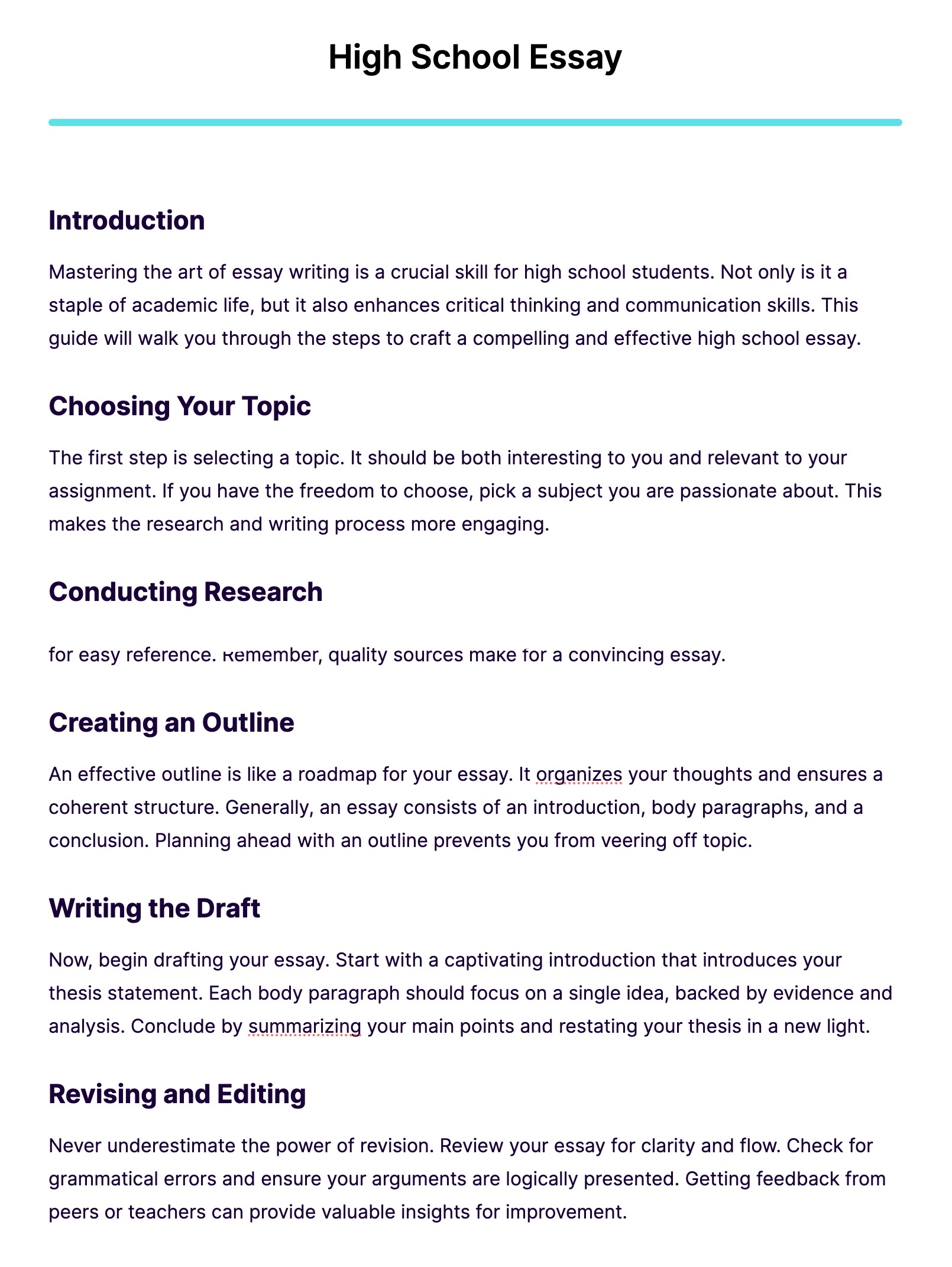
Free Download
High School Essay For Students
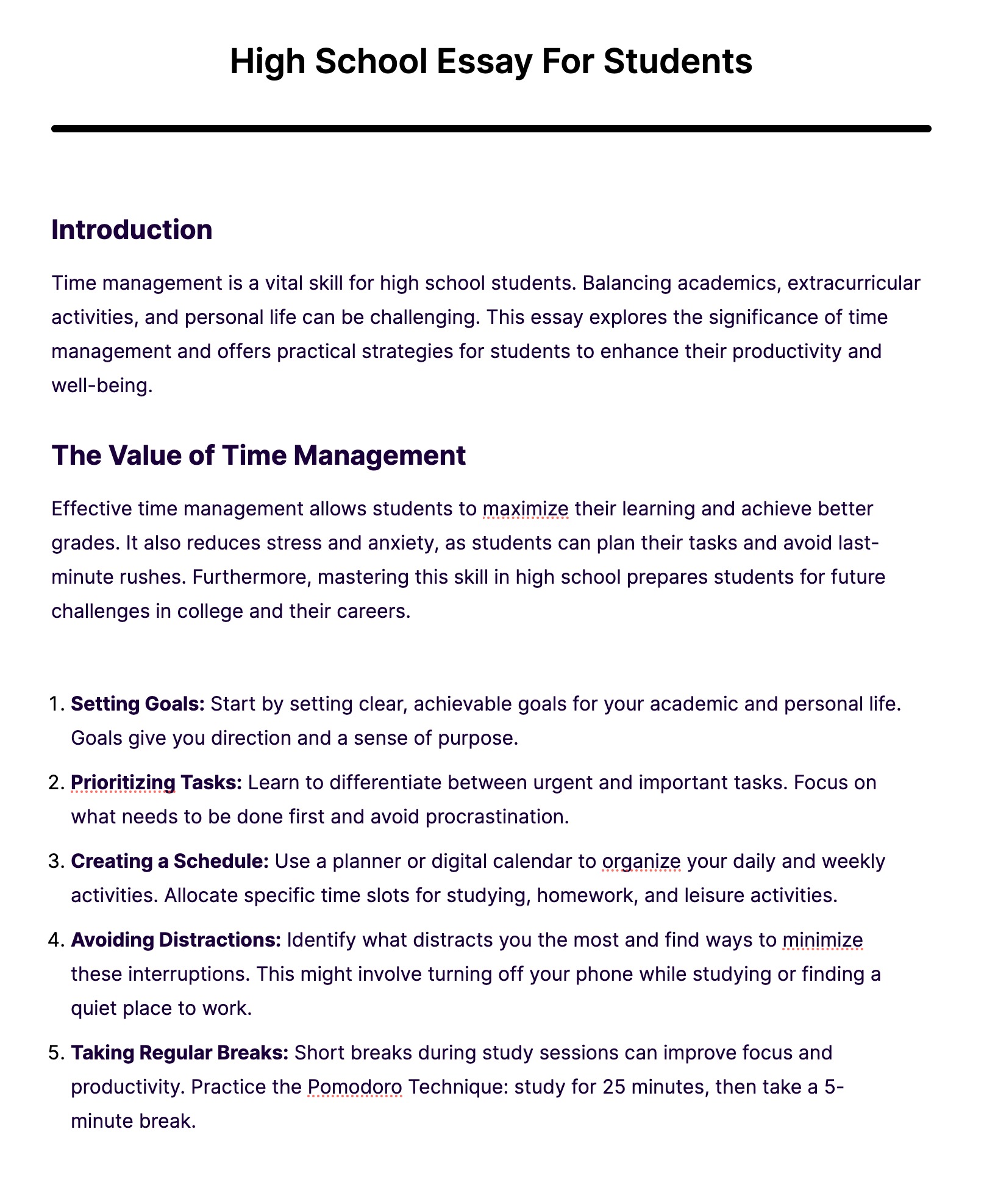
High School Essay Outline
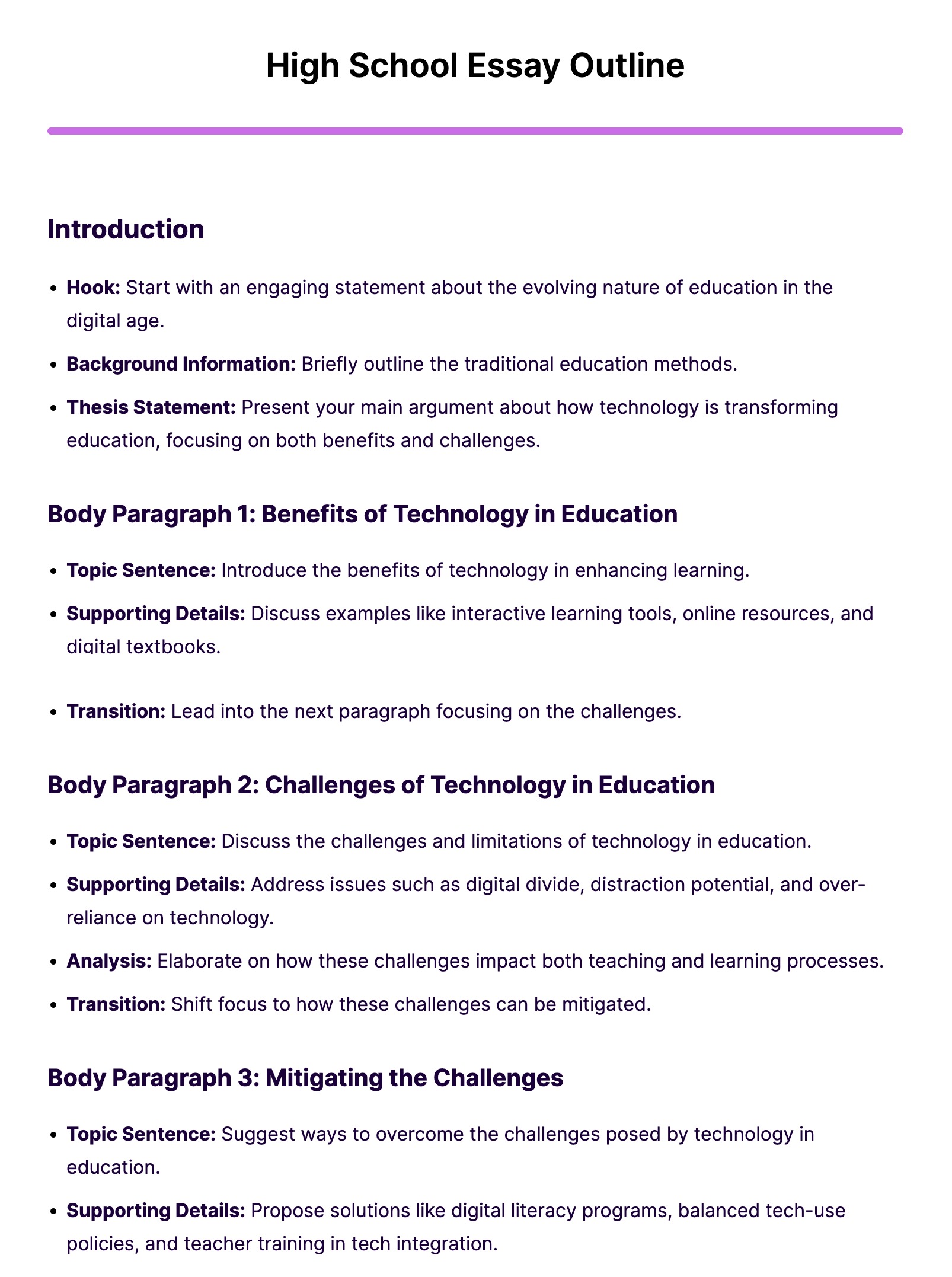
High School Essay Example
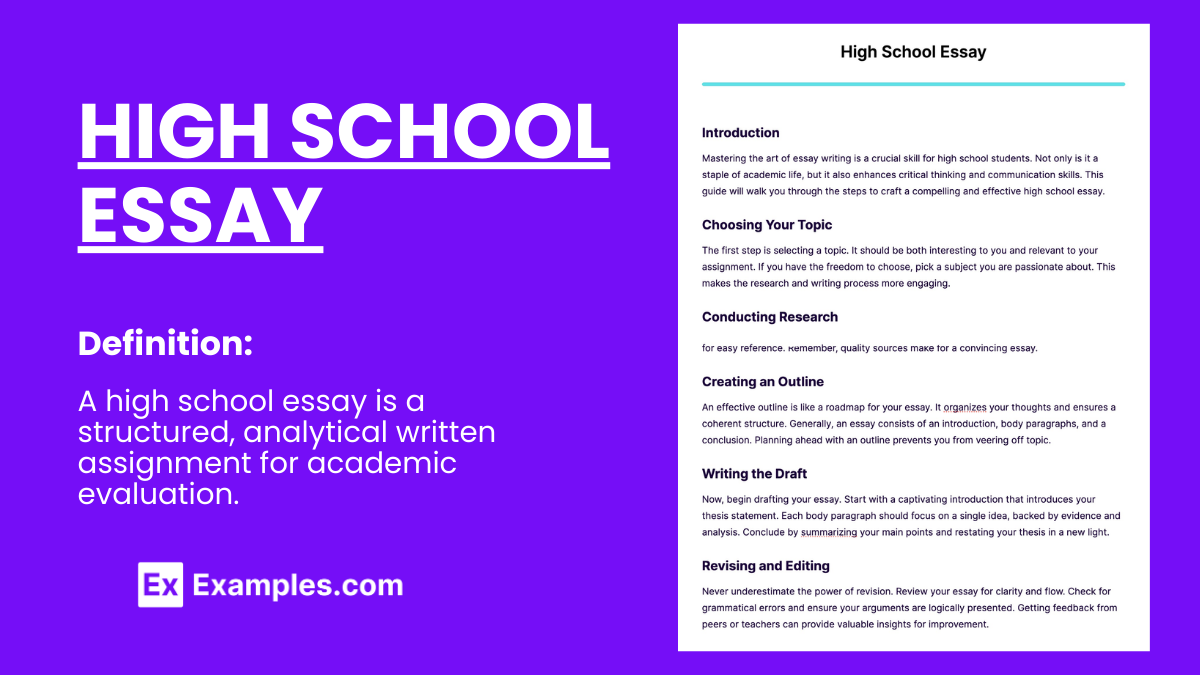
High School Self Introduction Essay Template
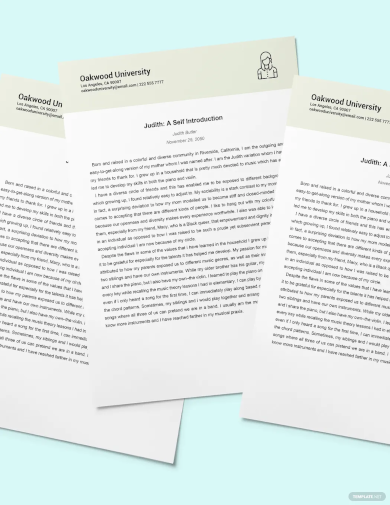
High School Student Essay
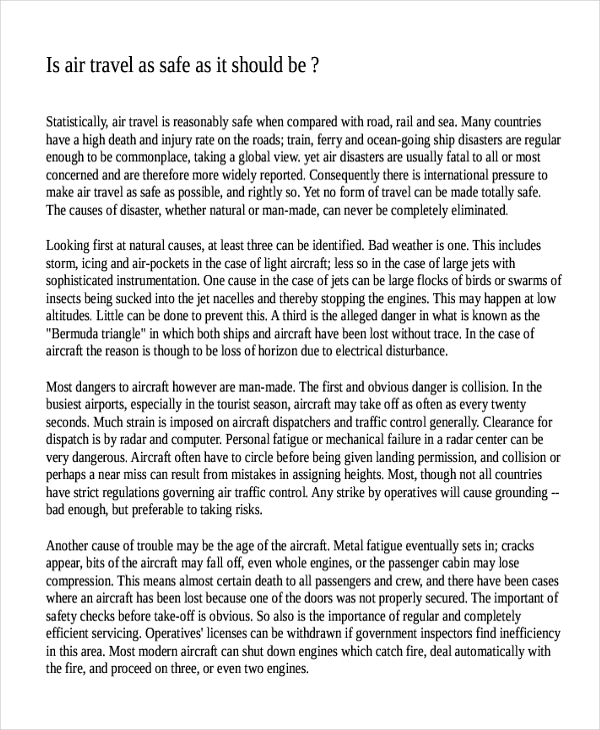
englishdaily626.com
Reflective High School
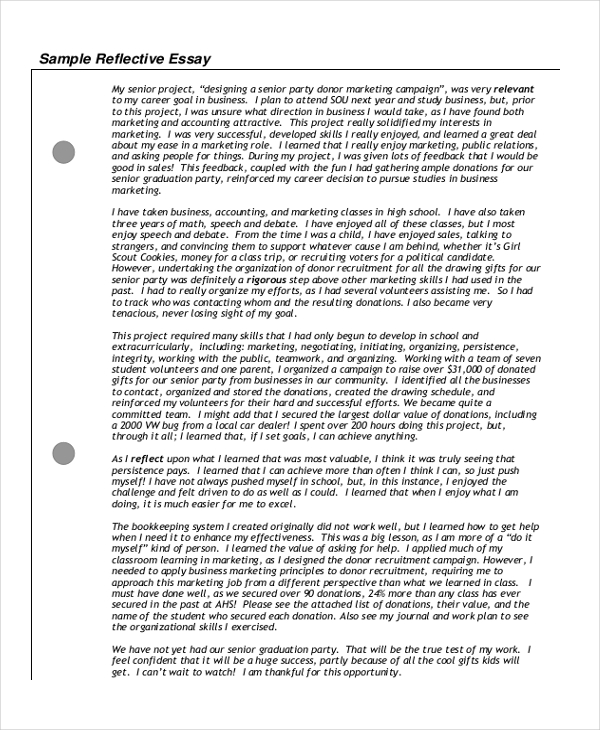
oregoncis.uoregon.edu
Argumentative Essays for High School
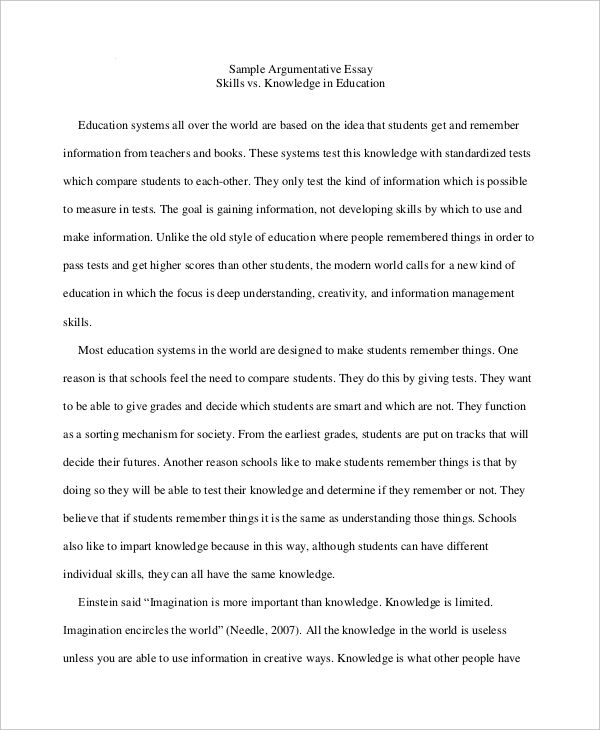
Informative Essays for High School
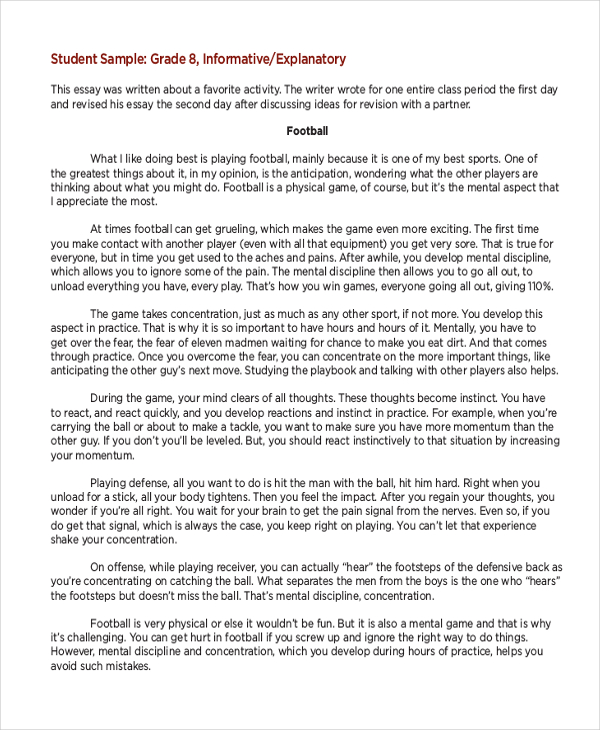
High School Persuasive
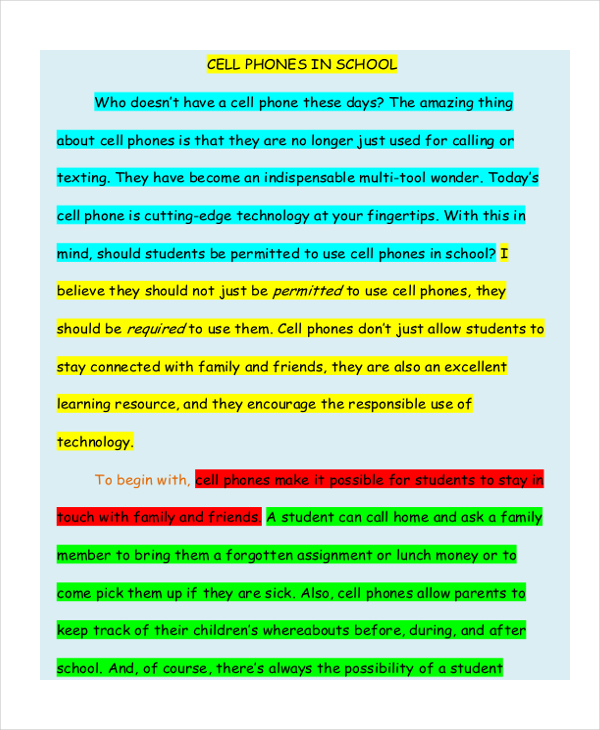
writecook.com
Narrative Essays
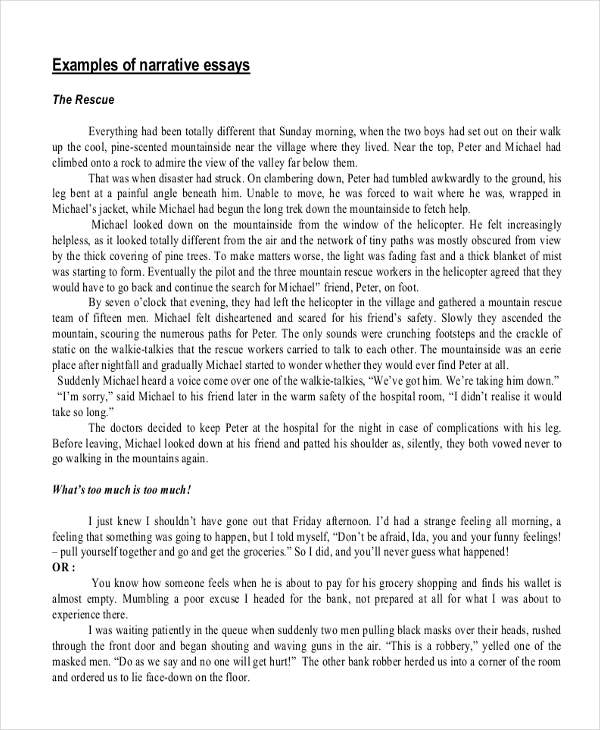
Scholarship Essays
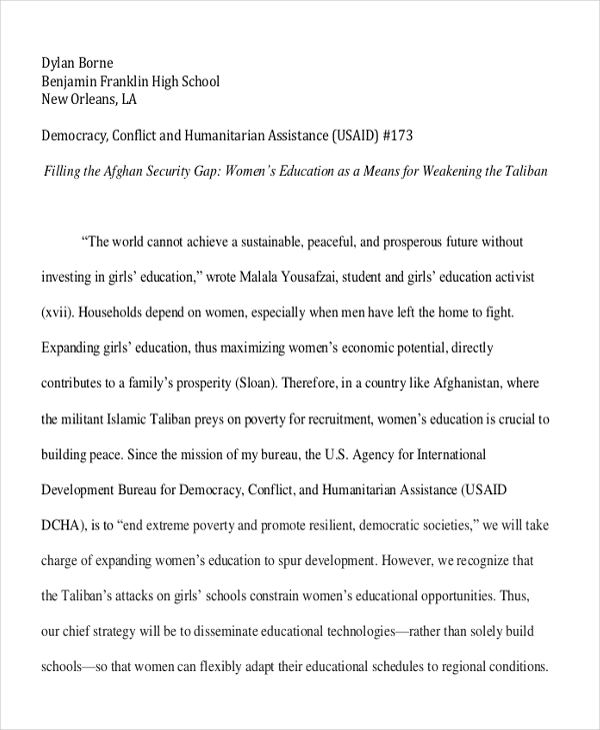
High School Application
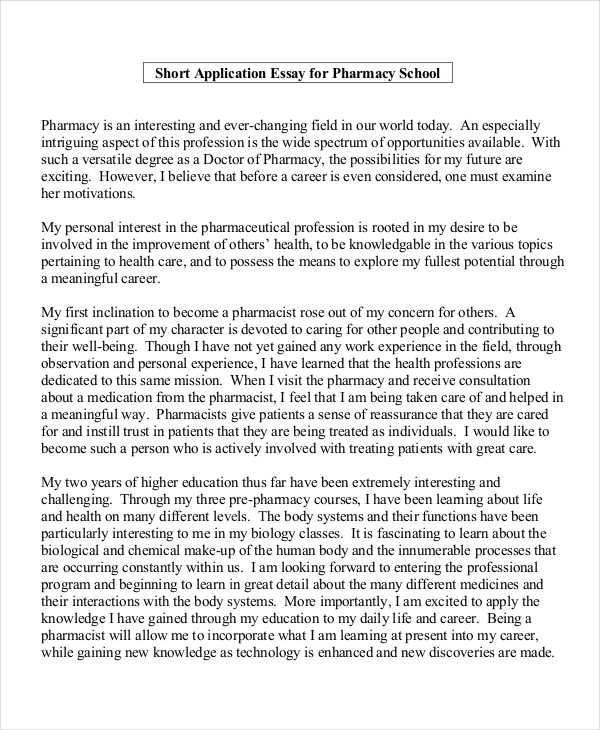
e-education.psu.edu
High School Graduation Essay
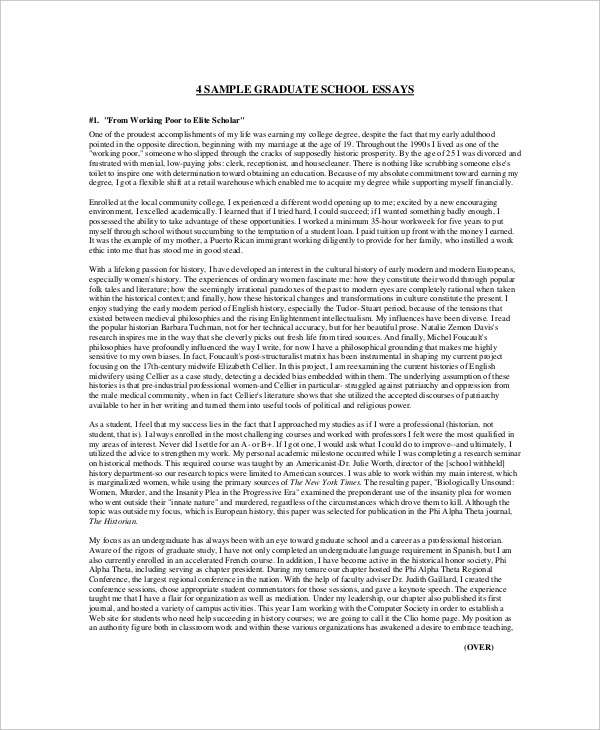
High School Leadership Essay
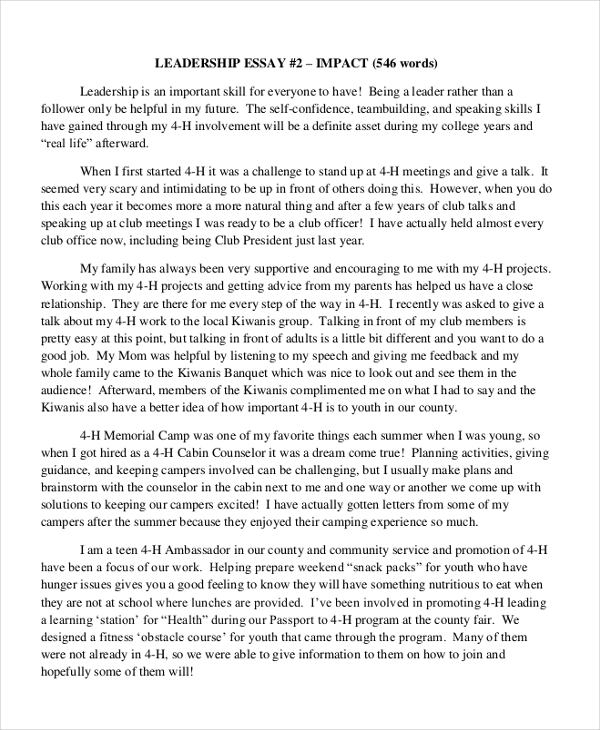
web.extension.illinois.edu
How to Write a High School Essay
Some teachers are really not that strict when it comes to writing essay because they too understand the struggles of writing stuff like these. However, you need to know the basics when it comes to writing a high school essay.
1. Understand the Essay Prompt
- Carefully read the essay prompt or question to understand what’s required. Identify the type of essay (narrative, persuasive, expository, etc.) and the main topic you need to address.
2. Choose a Topic
- If the topic isn’t provided, pick one that interests you and fits the essay’s requirements. Make sure it’s neither too broad nor too narrow.
3. Conduct Research (if necessary)
- For expository, argumentative, or research essays, gather information from credible sources to support your arguments. Take notes and organize your findings.
4. Create an Outline
- Outline your essay to organize your thoughts and structure your arguments effectively. Include an introduction, body paragraphs, and a conclusion.
5. Write the Introduction
- Start with a hook to grab the reader’s attention (a quote, a question, a shocking fact, etc.). Introduce your topic and end the introduction with a thesis statement that presents your main argument or purpose.
6. Develop Body Paragraphs
- Each body paragraph should focus on a single idea or argument that supports your thesis. Start with a topic sentence, provide evidence or examples, and explain how it relates to your thesis.
7. Write the Conclusion
- Summarize the main points of your essay and restate your thesis in a new way. Conclude with a strong statement that leaves a lasting impression on the reader.
Types of High School Essay
1. narrative essay.
Narrative essays tell a story from the writer’s perspective, often highlighting a personal experience or event. The focus is on storytelling, including characters, a setting, and a plot, to engage readers emotionally. This type allows students to explore creativity and expressiveness in their writing.
2. Descriptive Essay
Descriptive essays focus on detailing and describing a person, place, object, or event. The aim is to paint a vivid picture in the reader’s mind using sensory details. These essays test the writer’s ability to use language creatively to evoke emotions and bring a scene to life.
3. Expository Essay
Expository essays aim to explain or inform the reader about a topic in a clear, concise manner. This type of essay requires thorough research and focuses on factual information. It’s divided into several types, such as compare and contrast, cause and effect, and process essays, each serving a specific purpose.
4. Persuasive Essay
Persuasive essays aim to convince the reader of a particular viewpoint or argument. The writer must use logic, reasoning, and evidence to support their position while addressing counterarguments. This type tests the writer’s ability to persuade and argue effectively.
5. Analytical Essay
Analytical essays require the writer to break down and analyze an element, such as a piece of literature, a movie, or a historical event. The goal is to interpret and make sense of the subject, discussing its significance and how it achieves its purpose.
6. Reflective Essay
Reflective essays are personal pieces that ask the writer to reflect on their experiences, thoughts, or feelings regarding a specific topic or experience. It encourages introspection and personal growth by examining one’s responses and learning from them.
7. Argumentative Essay
Similar to persuasive essays, argumentative essays require the writer to take a stance on an issue and argue for their position with evidence. However, argumentative essays place a stronger emphasis on evidence and logic rather than emotional persuasion.
8. Research Paper
Though often longer than a typical essay, research papers in high school require students to conduct in-depth study on a specific topic, using various sources to gather information. The focus is on presenting findings and analysis in a structured format.
Tips for High School Essays
Writing a high school essay if you have the tips on how to do essay effectively . This will give you an edge from your classmates.
- Stay Organized: Keep your notes and sources well-organized to make the writing process smoother.
- Be Clear and Concise: Avoid overly complex sentences or vocabulary that might confuse the reader.
- Use Transitions: Ensure that your paragraphs and ideas flow logically by using transition words and phrases.
- Cite Sources: If you use direct quotes or specific ideas from your research, make sure to cite your sources properly to avoid plagiarism.
- Practice: Like any skill, essay writing improves with practice. Don’t hesitate to write drafts and experiment with different writing styles.
Importance of High School Essay
Aside from the fact that you will get reprimanded for not doing your task, there are more substantial reasons why a high school essay is important. First, you get trained at a very young age. Writing is not just for those who are studying nor for your teachers. As you graduate from high school and then enter college (can see college essays ), you will have more things to write like dissertations and theses.
At least, when you get to that stage, you already know how to write. Aside from that, writing high essays give a life lesson. That is, patience and resourcefulness. You need to find the right resources for your essay as well as patience when finding the right inspiration to write.
How long is a high school essay?
A high school essay typically ranges from 500 to 2000 words, depending on the assignment’s requirements and the subject matter.
How do you start a personal essay for high school?
Begin with an engaging hook (an anecdote, quote, or question) that introduces your theme or story, leading naturally to your thesis or main point.
What makes a good high school essay?
A good high school essay features a clear thesis, coherent structure, compelling evidence, and personal insights, all presented in a polished, grammatically correct format.

High School Essay Generator
Text prompt
- Instructive
- Professional
Write a High School Essay on the importance of participating in sports.
Discuss the role of student government in high schools in a High School Essay.
Examples of Great Introductory Paragraphs
Grab your reader's attention with the first words
- Ph.D., Rhetoric and English, University of Georgia
- M.A., Modern English and American Literature, University of Leicester
- B.A., English, State University of New York
An introductory paragraph, as the opening of a conventional essay , composition , or report , is designed to grab people's attention. It informs readers about the topic and why they should care about it but also adds enough intrigue to get them to continue to read. In short, the opening paragraph is your chance to make a great first impression.
Writing a Good Introductory Paragraph
The primary purpose of an introductory paragraph is to pique the interest of your reader and identify the topic and purpose of the essay. It often ends with a thesis statement .
You can engage your readers right from the start through a number of tried-and-true ways. Posing a question, defining the key term, giving a brief anecdote , using a playful joke or emotional appeal, or pulling out an interesting fact are just a few approaches you can take. Use imagery, details, and sensory information to connect with the reader if you can. The key is to add intrigue along with just enough information so your readers want to find out more.
One way to do this is to come up with a brilliant opening line . Even the most mundane topics have aspects interesting enough to write about; otherwise, you wouldn't be writing about them, right?
When you begin writing a new piece, think about what your readers want or need to know. Use your knowledge of the topic to craft an opening line that will satisfy that need. You don't want to fall into the trap of what writers call "chasers" that bore your readers (such as "The dictionary defines...."). The introduction should make sense and hook the reader right from the start .
Make your introductory paragraph brief. Typically, just three or four sentences are enough to set the stage for both long and short essays. You can go into supporting information in the body of your essay, so don't tell the audience everything all at once.
Should You Write the Intro First?
You can always adjust your introductory paragraph later. Sometimes you just have to start writing. You can start at the beginning or dive right into the heart of your essay.
Your first draft may not have the best opening, but as you continue to write, new ideas will come to you, and your thoughts will develop a clearer focus. Take note of these and, as you work through revisions , refine and edit your opening.
If you're struggling with the opening, follow the lead of other writers and skip it for the moment. Many writers begin with the body and conclusion and come back to the introduction later. It's a useful, time-efficient approach if you find yourself stuck in those first few words.
Start where it's easiest to start. You can always go back to the beginning or rearrange later, especially if you have an outline completed or general framework informally mapped out. If you don't have an outline, even just starting to sketch one can help organize your thoughts and "prime the pump" as it were.
Successful Introductory Paragraphs
You can read all the advice you want about writing a compelling opening, but it's often easier to learn by example. Take a look at how some writers approached their essays and analyze why they work so well.
"As a lifelong crabber (that is, one who catches crabs, not a chronic complainer), I can tell you that anyone who has patience and a great love for the river is qualified to join the ranks of crabbers. However, if you want your first crabbing experience to be a successful one, you must come prepared."
– (Mary Zeigler, "How to Catch River Crabs" )
What did Zeigler do in her introduction? First, she wrote in a little joke, but it serves a dual purpose. Not only does it set the stage for her slightly more humorous approach to crabbing, but it also clarifies what type of "crabber" she's writing about. This is important if your subject has more than one meaning.
The other thing that makes this a successful introduction is the fact that Zeigler leaves us wondering. What do we have to be prepared for? Will the crabs jump up and latch onto you? Is it a messy job? What tools and gear do I need? She leaves us with questions, and that draws us in because now we want answers.
"Working part-time as a cashier at the Piggly Wiggly has given me a great opportunity to observe human behavior. Sometimes I think of the shoppers as white rats in a lab experiment, and the aisles as a maze designed by a psychologist. Most of the rats—customers, I mean—follow a routine pattern, strolling up and down the aisles, checking through my chute, and then escaping through the exit hatch. But not everyone is so dependable. My research has revealed three distinct types of abnormal customer: the amnesiac, the super shopper, and the dawdler."
– "Shopping at the Pig"
This revised classification essay begins by painting a picture of an ordinary scenario: the grocery store. But when used as an opportunity to observe human nature, as this writer does, it turns from ordinary to fascinating.
Who is the amnesiac? Would I be classified as the dawdler by this cashier? The descriptive language and the analogy to rats in a maze add to the intrigue, and readers are left wanting more. For this reason, even though it's lengthy, this is an effective opening.
"In March 2006, I found myself, at 38, divorced, no kids, no home, and alone in a tiny rowing boat in the middle of the Atlantic Ocean. I hadn’t eaten a hot meal in two months. I’d had no human contact for weeks because my satellite phone had stopped working. All four of my oars were broken, patched up with duct tape and splints. I had tendinitis in my shoulders and saltwater sores on my backside.
"I couldn’t have been happier...."
– Roz Savage, " My Transoceanic Midlife Crisis ." Newsweek , March 20, 2011
Here is an example of reversing expectations. The introductory paragraph is filled with doom and gloom. We feel sorry for the writer but are left wondering whether the article will be a classic sob story. It is in the second paragraph where we find out that it's quite the opposite.
Those first few words of the second paragraph—which we cannot help but skim—surprise us and thus draw us in. How can the narrator be happy after all that sorrow? This reversal compels us to find out what happened.
Most people have had streaks where nothing seems to go right. Yet, it is the possibility of a turn of fortunes that compels us to keep going. This writer appealed to our emotions and a sense of shared experience to craft an effective read.
- Understanding General-to-Specific Order in Composition
- How to Structure an Essay
- The Introductory Paragraph: Start Your Paper Off Right
- 6 Steps to Writing the Perfect Personal Essay
- Write an Attention-Grabbing Opening Sentence for an Essay
- The Ultimate Guide to the 5-Paragraph Essay
- What Is a Compelling Introduction?
- How to Write a Great Process Essay
- 3 Changes That Will Take Your Essay From Good To Great
- How To Write an Essay
- How to Write a Great Book Report
- Definition and Examples of Analysis in Composition
- How to Write and Format an MBA Essay
- How to Write a Great Essay for the TOEFL or TOEIC
- How to Write a Great College Application Essay Title
- How to Help Your 4th Grader Write a Biography
What are your chances of acceptance?
Calculate for all schools, your chance of acceptance.
Your chancing factors
Extracurriculars.
50 Engaging Narrative Essay Topics for High Schoolers
Do you know how to improve your profile for college applications.
See how your profile ranks among thousands of other students using CollegeVine. Calculate your chances at your dream schools and learn what areas you need to improve right now — it only takes 3 minutes and it's 100% free.
Show me what areas I need to improve
What’s Covered:
Narrative essays vs. analytical essays, how to pick the right narrative essay topic, elements of a strong narrative essay, engaging narrative essay topics for high schoolers, where to get your narrative essay edited for free.
Narrative essays are an extensive form of writing that gives readers the opportunity to follow along as a person goes through a journey or sets of experiences. Rather than providing analytic insight, narrative essays simply share a story and offer a first-person account. These essays may seem easy to write at first, but it takes a certain finesse to write a narrative essay that is interesting, cohesive, and well-researched. Whether you’re looking for a unique topic to write about, or just want some new inspiration, CollegeVine is here to help! These 50 narrative essay topics are engaging, unique and will have you writing in no time.
A narrative essay is a great way to express your personal experiences and opinions, but it is important to remember that this type of essay is different from an analytical paper. In a narrative essay, you do not need to provide background information or explain your thoughts and feelings; instead, you simply tell a story. It’s important to avoid too much telling in your writing; instead, use creative details and vivid imagery to make readers feel as if they are actually right there with you.
Where You Will Encounter Narrative Essays
This type of essay is typically encountered in high school, where students may be required to write personal statements to prepare for their Common App essay . Narrative essays are also commonly seen in AP Language and Composition. Therefore, it’s important you are aware of the style because you are bound to have a narrative essay assignment.
Of course, before you start writing, it is important to pick the right essay topic. There are many factors involved in the process of picking the perfect narrative essay topic for your story.
You should always choose a topic that you are passionate about, since writing on something you care about will make the process much easier. Not only will it be more interesting to create your paper around something that truly interests you, but it will also allow you to fully express yourself in your essay. You also want to be sure that the topic has enough material to work with. If your chosen topic is too short, you will not have enough content to write a complete paper. For example, if you are writing about your experience getting lost at the mall, make sure that you have enough information to work with to craft an engaging narrative.
The best topic for an engaging narrative essay is one that focuses on showing versus telling, has a clear structure, and provides a dialogue. These elements come together to form an engaging narrative essay. Regardless of what subject you pick, any topic may be turned into a fascinating, A+ worthy narrative using the tips below.
Show, Don’t Tell
To write a good narrative essay, it’s important to show, not tell. Instead of simply informing your audience, show them what you mean. For example, instead of saying “I was nervous,” you could say “My heart began to race and my stomach filled with butterflies.” Also make sure to use sensory details, such as sights, sounds and tastes, and include a personal reflection at the end of your narrative.
Begin with a Strong Opening Line
A good narrative essay will begin with an attention-grabbing opening line. But make sure to avoid common clichés, such as “It was the best of times, it was the worst of times.” Instead, come up with something original and specific to you and your situation. For example: “My pre-calc teacher was obsessed with circles. I mean, he even used circular note cards.” Or, “It all started the day my mom brought home a guinea pig.”
Follows a Three-Act Structure
A strong narrative essay follows the same three-act structure as other essays. But in order to make it interesting, you’ll need to come up with a creative way to break things down into sections. For example, using the guinea pig example from above, you could write the following:
- Act 1 – Introduction: The day my mom brought home a guinea pig.
- Act 2 – Conflict: The day I had to say goodbye to my beloved pet.
- Act 3 – Conclusion: Looking back at how much I miss him now that he’s gone.
Conclude with Personal Reflection
To conclude your narrative essay, you’ll want to explain what this specific experience taught you or how you’ve changed. For example, upon realizing that her pre-calc teacher was obsessed with circles, the writer of the previous example begins to notice circular shapes everywhere. Another way to conclude your narrative essay is by touching on how this experience impacted you emotionally. For example, after losing his guinea pig, the writer explains how much he missed it.
Use Dialogue
Include a conversation in your essay to make it come alive. For example, instead of simply saying that you met a new friend, talk about how you introduced yourselves or what they were wearing when you met them.

Discover your chances at hundreds of schools
Our free chancing engine takes into account your history, background, test scores, and extracurricular activities to show you your real chances of admission—and how to improve them.
The following list of 50 narrative essay topics is divided into categories. This will make it easier to find a topic that fits your writing style.
1. What is a childhood song that still sticks with you today?
2. Your first day of Kindergarten
3. Talk about a time when you’re siblings looked up to you
4. Describe the best birthday party you’ve ever had
5. Talk about the best day you ever spent with a childhood friend
6. Explain your first childhood hobby
7. Describe your first halloween costume
8. A family vacation gone wrong
9. Your first family reunion
10. Describe a tradition that is unique to your family
11. Describe your family to a person who’s never met them before
12. What frustrates you most about your family
13. If you could only keep one memory of your family, what would it be and why?
14. Describe a time your family embarrassed you in public
15. The most beautiful place in the world
16. Your favorite season and why
17. If you were a part of nature, what element would you be? Why?
18. When you go outside, which of your senses are you most thankful to have?
19. Describe the first time you witnessed a tornado
20. Write a poem about your favorite season
21. Describe yourself as one of the four seasons
22. Describe a time in which you felt connected with nature
23. Describe the first time you played an instrument and how you felt
24. What major event would be much worse if music was removed, and why?
25. If you could only listen to one song for the rest of your life, what would it be and why?
26. What would a life without music look like?
27. If you could master one instrument, what would it be and why?
Relationships
28. What if you had never met your best friend?
29. Describe a time when you fixed a broken relationship
30. Talk about a movie that defined a relationship for you
31. Describe your first date
32. Describe the first time you made a friend
33. Describe your relationship with your parents
Self Reflection
34. Have you ever fooled someone? If so, describe what happened and how you felt about it
35. What is the worst thing you’ve done to someone else?
36. Write about the difference between how things seem and how they really are.
37. Have you ever been embarrassed in some way? If so, describe the situation and how it affected you as well as those around you
38. Have you ever witnessed something really beautiful? Describe it
39. Is your glass half empty or half full?
Overcoming Adversity
40. Have you ever been very afraid of something but tried your hardest to appear fearless? If so, describe that experience
41. When have you ever succeeded when you thought you might fail
42. What are your secret survival strategies?
43. Describe the last time you were stressed and why?
44. Describe a time when you were discriminated against
45. The most memorable class you’ve had and why
46. Your favorite study abroad memory
47. Describe your kindergarten classroom
48. Describe your first teacher
49. The first time you experienced detention
50. Your first field trip
Hopefully these topics will get you thinking about a personal experience that could make for a thoughtful and engaging narrative essay. Remember, a strong narrative essay must contain relatable details and a clear flow that keeps the reader entertained and engaged to read all the way to the end.
If you need some additional guidance on your narrative essay, use CollegeVine’s free peer review essay tool to get feedback for free!
Related CollegeVine Blog Posts

- Grades 6-12
- School Leaders
FREE Book Bracket Template. For March and Beyond!
The Big List of Essay Topics for High School (120+ Ideas!)
Ideas to inspire every young writer!

High school students generally do a lot of writing, learning to use language clearly, concisely, and persuasively. When it’s time to choose an essay topic, though, it’s easy to come up blank. If that’s the case, check out this huge round-up of essay topics for high school. You’ll find choices for every subject and writing style.
- Argumentative Essay Topics
- Cause-and-Effect Essay Topics
- Compare-Contrast Essay Topics
- Descriptive Essay Topics
- Expository and Informative Essay Topics
- Humorous Essay Topics
Literary Essay Topics
- Narrative and Personal Essay Topics
- Personal Essay Topics
- Persuasive Essay Topics
Research Essay Topics
Argumentative essay topics for high school.
When writing an argumentative essay, remember to do the research and lay out the facts clearly. Your goal is not necessarily to persuade someone to agree with you, but to encourage your reader to accept your point of view as valid. Here are some possible argumentative topics to try. ( Here are 100 more compelling argumentative essay topics. )
- The most important challenge our country is currently facing is … (e.g., immigration, gun control, economy)
- The government should provide free internet access for every citizen.
- All drugs should be legalized, regulated, and taxed.
- Vaping is less harmful than smoking tobacco.
- The best country in the world is …
- Parents should be punished for their minor children’s crimes.
- Should all students have the ability to attend college for free?
- Should physical education be part of the standard high school curriculum?

WeAreTeachers
- Schools should require recommended vaccines for all students, with very limited exceptions.
- Is it acceptable to use animals for experiments and research?
- Does social media do more harm than good?
- Capital punishment does/does not deter crime.
- What one class should all high schools students be required to take and pass in order to graduate?
- Do we really learn anything from history, or does it just repeat itself over and over?
- Are men and women treated equally?
Cause-and-Effect Essay Topics for High School
A cause-and-effect essay is a type of argumentative essay. Your goal is to show how one specific thing directly influences another specific thing. You’ll likely need to do some research to make your point. Here are some ideas for cause-and-effect essays. ( Get a big list of 100 cause-and-effect essay topics here. )
- Humans are causing accelerated climate change.
- Fast-food restaurants have made human health worse over the decades.
- What caused World War II? (Choose any conflict for this one.)
- Describe the effects social media has on young adults.

- How does playing sports affect people?
- What are the effects of loving to read?
- Being an only/oldest/youngest/middle child makes you …
- What effect does violence in movies or video games have on kids?
- Traveling to new places opens people’s minds to new ideas.
- Racism is caused by …
Compare-Contrast Essay Topics for High School
As the name indicates, in compare-and-contrast essays, writers show the similarities and differences between two things. They combine descriptive writing with analysis, making connections and showing dissimilarities. The following ideas work well for compare-contrast essays. ( Find 80+ compare-contrast essay topics for all ages here. )
- Public and private schools
- Capitalism vs. communism
- Monarchy or democracy
- Dogs vs. cats as pets

- Paper books or e-books
- Two political candidates in a current race
- Going to college vs. starting work full-time
- Working your way through college as you go or taking out student loans
- iPhone or Android
- Instagram vs. Twitter (or choose any other two social media platforms)
Descriptive Essay Topics for High School
Bring on the adjectives! Descriptive writing is all about creating a rich picture for the reader. Take readers on a journey to far-off places, help them understand an experience, or introduce them to a new person. Remember: Show, don’t tell. These topics make excellent descriptive essays.
- Who is the funniest person you know?
- What is your happiest memory?
- Tell about the most inspirational person in your life.
- Write about your favorite place.
- When you were little, what was your favorite thing to do?
- Choose a piece of art or music and explain how it makes you feel.
- What is your earliest memory?

- What’s the best/worst vacation you’ve ever taken?
- Describe your favorite pet.
- What is the most important item in the world to you?
- Give a tour of your bedroom (or another favorite room in your home).
- Describe yourself to someone who has never met you.
- Lay out your perfect day from start to finish.
- Explain what it’s like to move to a new town or start a new school.
- Tell what it would be like to live on the moon.
Expository and Informative Essay Topics for High School
Expository essays set out clear explanations of a particular topic. You might be defining a word or phrase or explaining how something works. Expository or informative essays are based on facts, and while you might explore different points of view, you won’t necessarily say which one is “better” or “right.” Remember: Expository essays educate the reader. Here are some expository and informative essay topics to explore. ( See 70+ expository and informative essay topics here. )
- What makes a good leader?
- Explain why a given school subject (math, history, science, etc.) is important for students to learn.
- What is the “glass ceiling” and how does it affect society?
- Describe how the internet changed the world.
- What does it mean to be a good teacher?

- Explain how we could colonize the moon or another planet.
- Discuss why mental health is just as important as physical health.
- Describe a healthy lifestyle for a teenager.
- Choose an American president and explain how their time in office affected the country.
- What does “financial responsibility” mean?
Humorous Essay Topics for High School
Humorous essays can take on any form, like narrative, persuasive, or expository. You might employ sarcasm or satire, or simply tell a story about a funny person or event. Even though these essay topics are lighthearted, they still take some skill to tackle well. Give these ideas a try.
- What would happen if cats (or any other animal) ruled the world?
- What do newborn babies wish their parents knew?
- Explain the best ways to be annoying on social media.
- Invent a wacky new sport, explain the rules, and describe a game or match.

- Imagine a discussion between two historic figures from very different times, like Cleopatra and Queen Elizabeth I.
- Retell a familiar story in tweets or other social media posts.
- Describe present-day Earth from an alien’s point of view.
- Choose a fictional character and explain why they should be the next president.
- Describe a day when kids are in charge of everything, at school and at home.
Literary essays analyze a piece of writing, like a book or a play. In high school, students usually write literary essays about the works they study in class. These literary essay topic ideas focus on books students often read in high school, but many of them can be tweaked to fit other works as well.
- Discuss the portrayal of women in Shakespeare’s Othello .
- Explore the symbolism used in The Scarlet Letter .
- Explain the importance of dreams in Of Mice and Men .
- Compare and contrast the romantic relationships in Pride and Prejudice .

- Dissect the allegory of Animal Farm and its relation to contemporary events.
- Interpret the author’s take on society and class structure in The Great Gatsby .
- Explore the relationship between Hamlet and Ophelia.
- Discuss whether Shakespeare’s portrayal of young love in Romeo and Juliet is accurate.
- Explain the imagery used in Beowulf .
Narrative and Personal Essay Topics for High School
Think of a narrative essay like telling a story. Use some of the same techniques that you would for a descriptive essay, but be sure you have a beginning, middle, and end. A narrative essay doesn’t necessarily need to be personal, but they often are. Take inspiration from these narrative and personal essay topics.
- Describe a performance or sporting event you took part in.
- Explain the process of cooking and eating your favorite meal.
- Write about meeting your best friend for the first time and how your relationship developed.
- Tell about learning to ride a bike or drive a car.
- Describe a time in your life when you’ve been scared.

- Share the most embarrassing thing that ever happened to you.
- Tell about a time when you overcame a big challenge.
- Tell the story of how you learned an important life lesson.
- Describe a time when you or someone you know experienced prejudice or oppression.
- Explain a family tradition, how it developed, and its importance today.
- What is your favorite holiday? How does your family celebrate it?
- Retell a familiar story from the point of view of a different character.
- Describe a time when you had to make a difficult decision.
- Tell about your proudest moment.
Persuasive Essay Topics for High School
Persuasive essays are similar to argumentative , but they rely less on facts and more on emotion to sway the reader. It’s important to know your audience, so you can anticipate any counterarguments they might make and try to overcome them. Try these topics to persuade someone to come around to your point of view. ( Discover 60 more intriguing persuasive essay topics here. )
- Do you think homework should be required, optional, or not given at all?
- Everyone should be vegetarian or vegan.
- What animal makes the best pet?
- Visit an animal shelter, choose an animal that needs a home, and write an essay persuading someone to adopt that animal.
- Who is the world’s best athlete, present or past?
- Should little kids be allowed to play competitive sports?
- Are professional athletes/musicians/actors overpaid?
- The best music genre is …

- Is democracy the best form of government?
- Is capitalism the best form of economy?
- Students should/should not be able to use their phones during the school day.
- Should schools have dress codes?
- If I could change one school rule, it would be …
- Is year-round school a good idea?
A research essay is a classic high school assignment. These papers require deep research into primary source documents, with lots of supporting facts and evidence that’s properly cited. Research essays can be in any of the styles shown above. Here are some possible topics, across a variety of subjects.
- Which country’s style of government is best for the people who live there?
- Choose a country and analyze its development from founding to present day.
- Describe the causes and effects of a specific war.
- Formulate an ideal economic plan for our country.
- What scientific discovery has had the biggest impact on life today?

- Analyze the way mental health is viewed and treated in this country.
- Explore the ways systemic racism impacts people in all walks of life.
- Defend the importance of teaching music and the arts in public schools.
- Choose one animal from the endangered species list, and propose a realistic plan to protect it.
What are some of your favorite essay topics for high school? Come share your prompts on the WeAreTeachers HELPLINE group on Facebook .
Plus, check out the ultimate guide to student writing contests .
We Are Teachers
You Might Also Like

100 Thought-Provoking Argumentative Writing Prompts for Kids and Teens
Practice making well-reasoned arguments using research and facts. Continue Reading
Copyright © 2023. All rights reserved. 5335 Gate Parkway, Jacksonville, FL 32256
- PRO Courses Guides New Tech Help Pro Expert Videos About wikiHow Pro Upgrade Sign In
- EDIT Edit this Article
- EXPLORE Tech Help Pro About Us Random Article Quizzes Request a New Article Community Dashboard This Or That Game Popular Categories Arts and Entertainment Artwork Books Movies Computers and Electronics Computers Phone Skills Technology Hacks Health Men's Health Mental Health Women's Health Relationships Dating Love Relationship Issues Hobbies and Crafts Crafts Drawing Games Education & Communication Communication Skills Personal Development Studying Personal Care and Style Fashion Hair Care Personal Hygiene Youth Personal Care School Stuff Dating All Categories Arts and Entertainment Finance and Business Home and Garden Relationship Quizzes Cars & Other Vehicles Food and Entertaining Personal Care and Style Sports and Fitness Computers and Electronics Health Pets and Animals Travel Education & Communication Hobbies and Crafts Philosophy and Religion Work World Family Life Holidays and Traditions Relationships Youth
- Browse Articles
- Learn Something New
- Quizzes Hot
- This Or That Game New
- Train Your Brain
- Explore More
- Support wikiHow
- About wikiHow
- Log in / Sign up
- Education and Communications
- College University and Postgraduate
- Academic Writing
How to Write Any High School Essay
Last Updated: March 22, 2023 Fact Checked
This article was co-authored by Emily Listmann, MA and by wikiHow staff writer, Hunter Rising . Emily Listmann is a private tutor in San Carlos, California. She has worked as a Social Studies Teacher, Curriculum Coordinator, and an SAT Prep Teacher. She received her MA in Education from the Stanford Graduate School of Education in 2014. There are 14 references cited in this article, which can be found at the bottom of the page. This article has been fact-checked, ensuring the accuracy of any cited facts and confirming the authority of its sources. This article has been viewed 561,895 times.
Writing an essay is an important basic skill that you will need to succeed in high school and college. While essays will vary depending on your teacher and the assignment, most essays will follow the same basic structure. By supporting your thesis with information in your body paragraphs, you can successfully write an essay for any course!

Writing Help

Planning Your Essay

- Expository essays uses arguments to investigate and explain a topic.
- Persuasive essays try to convince the readers to believe or accept your specific point of view
- Narrative essays tell about a real-life personal experience.
- Descriptive essays are used to communicate deeper meaning through the use of descriptive words and sensory details.

- Look through books or use search engines online to look at the broad topic before narrowing your ideas down into something more concise.

- For example, the statement “Elephants are used to perform in circuses” does not offer an arguable point. Instead, you may try something like “Elephants should not be kept in the circus since they are mistreated.” This allows you to find supporting arguments or for others to argue against it.
- Keep in mind that some essay writing will not require an argument, such as a narrative essay. Instead, you might focus on a pivotal point in the story as your main claim.

- Talk to your school’s librarian for direction on specific books or databases you could use to find your information.
- Many schools offer access to online databases like EBSCO or JSTOR where you can find reliable information.
- Wikipedia is a great starting place for your research, but it can be edited by anyone in the world. Instead, look at the article’s references to find the sites where the information really came from.
- Use Google Scholar if you want to find peer-reviewed scholarly articles for your sources.
- Make sure to consider the author’s credibility when reviewing sources. If a source does not include the author’s name, then it might not be a good option.

- Outlines will vary in size or length depending on how long your essay needs to be. Longer essays will have more body paragraphs to support your arguments.
Starting an Essay

- Make sure your quotes or information are accurate and not an exaggeration of the truth, or else readers will question your validity throughout the rest of your essay.

- For example, “Because global warming is causing the polar ice caps to melt, we need to eliminate our reliance on fossil fuels within the next 5 years.” Or, “Since flavored tobacco appeals mainly to children and teens, it should be illegal for tobacco manufacturers to sell these products.”
- The thesis is usually the last or second to last sentence in your introduction.

- Use the main topics of your body paragraphs as an idea of what to include in your mini-outline.

Writing the Body Paragraphs

- Think of your topic sentences as mini-theses so your paragraphs only argue a specific point.

- Many high school essays are written in MLA or APA style. Ask your teacher what format they want you to follow if it’s not specified.

- Unless you’re writing a personal essay, avoid the use of “I” statements since this could make your essay look less professional.

- For example, if your body paragraphs discuss similar points in a different way, you can use phrases like “in the same way,” “similarly,” and “just as” to start other body paragraphs.
- If you are posing different points, try phrases like “in spite of,” “in contrast,” or “however” to transition.
Concluding Your Essay

- For example, if your thesis was, “The cell phone is the most important invention in the past 30 years,” then you may restate the thesis in your conclusion like, “Due to the ability to communicate anywhere in the world and access information easily, the cell phone is a pivotal invention in human history.”
- If you’re only writing a 1-page paper, restating your main ideas isn’t necessary.

- For example, if you write an essay discussing the themes of a book, think about how the themes are affecting people’s lives today.

- Try to pick the same type of closing sentence as you used as your attention getter.

- Including a Works Cited page shows that the information you provided isn’t all your own and allows the reader to visit the sources to see the raw information for themselves.
- Avoid using online citation machines since they may be outdated.
Revising the Paper

- Have a peer or parent read through your essay to see if they understand what point you’re trying to make.

- For example, if your essay discusses the history of an event, make sure your sentences flow in a chronological way in the order the events happened.

- If you cut parts out of your essay, make sure to reread it to see if it affects the flow of how it reads.

Community Q&A
- Allow ample time to layout your essay before you get started writing. Thanks Helpful 2 Not Helpful 0
- If you have writer's block , take a break for a few minutes. Thanks Helpful 2 Not Helpful 2
- Check the rubric provided by your teacher and compare your essay to it. This helps you gauge what you need to include or change. Thanks Helpful 0 Not Helpful 1

- Avoid using plagiarism since this could result in academic consequences. Thanks Helpful 5 Not Helpful 1
You Might Also Like

- ↑ https://www.grammarly.com/blog/types-of-essays/
- ↑ https://writingcenter.unc.edu/tips-and-tools/thesis-statements/
- ↑ https://guides.libs.uga.edu/reliability
- ↑ https://facultyweb.ivcc.edu/rrambo/eng1001/outline.htm
- ↑ https://examples.yourdictionary.com/20-compelling-hook-examples-for-essays.html
- ↑ https://wts.indiana.edu/writing-guides/how-to-write-a-thesis-statement.html
- ↑ https://guidetogrammar.org/grammar/five_par.htm
- ↑ https://learning.hccs.edu/faculty/jason.laviolette/persuasive-essay-outline
- ↑ https://academicguides.waldenu.edu/writingcenter/paragraphs/topicsentences
- ↑ https://writingcenter.unc.edu/tips-and-tools/transitions/
- ↑ https://writingcenter.fas.harvard.edu/pages/ending-essay-conclusions
- ↑ https://libguides.newcastle.edu.au/how-to-write-an-essay/conclusion
- ↑ https://pitt.libguides.com/citationhelp
- ↑ https://writingcenter.unc.edu/tips-and-tools/revising-drafts/
About This Article

Writing good essays is an important skill to have in high school, and you can write a good one by planning it out and organizing it well. Before you start, do some research on your topic so you can come up with a strong, specific thesis statement, which is essentially the main argument of your essay. For instance, your thesis might be something like, “Elephants should not be kept in the circus because they are mistreated.” Once you have your thesis, outline the paragraphs for your essay. You should have an introduction that includes your thesis, at least 3 body paragraphs that explain your main points, and a conclusion paragraph. Start each body paragraph with a topic sentence that states the main point of the paragraph. As you write your main points, make sure to include evidence and quotes from your research to back it up. To learn how to revise your paper, read more from our Writing co-author! Did this summary help you? Yes No
- Send fan mail to authors
Reader Success Stories
Ariel Arias Petzoldt
Aug 25, 2020
Did this article help you?

Nov 22, 2017
Rose Mpangala
Oct 24, 2018

Featured Articles

Trending Articles

Watch Articles

- Terms of Use
- Privacy Policy
- Do Not Sell or Share My Info
- Not Selling Info
Get all the best how-tos!
Sign up for wikiHow's weekly email newsletter
+1 (603) 932 7897

How to Write Any High School Essay
- Last modified 2024-04-01
- Published on 2021-08-13

The first step before you write any high school essay is to determine which type of essay you are required to write. There are 5 common types of high school essays : Descriptive, Narrative, Expository, Argumentative, and Analytical. With descriptive and narrative essays, you must use creativity to paint a story about a personal experience or communicate a deeper meaning through descriptive words and sensory details. Expository, argumentative, and analytical essays require you to investigate and explain a topic with different levels of detail and varied purposes.
Next, we provide details about strategies and tips for each type of essay to help you have a better step-by-step guide when approaching any writing assignment.
1. Descriptive Essay – The First High School Essay Type
A descriptive essay focuses on your ability to provide details and sensory descriptions for readers. So, what’s the step-by-step guide to a descriptive essay?
- Choose a specific essay topic and start brainstorming from there: With this kind of essay, you should focus on only one idea and expand on it, rather than spreading your essay thin to touch on different ideas. Once you settle on a topic, for example thunderstorms, you should write down a few related words: colors, sky, sea, cloud, rain, etc. Writing down those related words will help you have an overview and develop the essay from these descriptive words.
- Follow the structure: Start with a bold introduction, ease into the body paragraph with specific and sensory details, then end with a summary in the conclusion paragraph. A good introduction normally starts with a hook that invokes curiosity and urges the readers to learn more. After the hook, you should provide more context about what the readers can expect and what your essay will cover.
- Choose figurative and vivid language: Since the main point of a descriptive essay is in the sensory description, focus on providing vivid sensory details to enhance the description. Besides mentioning what something looks like, add what it feels, smells, sounds, or tastes like. Besides description, you can bring your emotions into the essay to connect with readers on a deeper level.
- Use transition words to lead the reader: It’s easy to fall deep into rambling about senses and descriptions. A solution to that is to use transition words to lead readers into the right stage of emotion. Having transition words will also help you understand the logical flow of the essay and have a good organization for the structure of the essay.
2. Narrative essays
Narrative high school essays ask you to tell readers about events, experiences, and incidents that happened to you or about a fictional event you imagined. The most common example of a narrative essay is the writing prompts for a personal statement when you apply to colleges. Below are the general tips for narrative essays:
- Make sure your essay has 5 elements: plot, characters, setting, conflict, and theme (can have a climax element if needed). Generally, a compelling story must have a strong plot and theme, which is the sequence of events that happened in the story and the purpose of each event. Many students make up a sequence of events to be ‘too good to be true,’ meaning that everything just lines up perfectly without any challenges or hardships for characters. A story is the reflection of real life; therefore, there must be ups and downs, as well as challenges people need to face. Conflicts are necessary to create tension, lead to resolution, and develop significant character development. In addition to plot, theme, and tension, a good story needs a setting to help readers understand the context where the event occurred. Of course, the characters involved in the event need to be mentioned and described.
- Feel free to use the first-person pronoun “I”: Since it’s your story being told from your point of view, you should use this whenever necessary to indicate and emphasize your emotions and feelings. But remember, don’t abuse this first-person pronoun, because it may distract readers from the story flow.
- Describe events in chronological order: You should write in chronological order to avoid confusing readers and help readers follow your thought process. If you’re an experienced writer, you can describe events that best fit your writing intention.
3. Expository
Expository high school essays are short pieces of academic writing that require evidence to explain or further investigate topics. Since expository essays focus on providing actual facts and evidence, having a neutral point of view is very critical. In order to write a great expository essay, you should:
- Provide a clear thesis statement in the introductory paragraph. You should put your thesis statement here because this will set the guidelines for the topics discussed within the thesis statement, and strengthen the effect and persuasion through the body paragraphs.
- Evidence support: when it comes to this type of essay, evidence support is not required to build a strong argument. Teachers give this assignment to students to test their understanding of the topic and their ability to present conveying information. Regardless of the evidence, you should still develop strong reasoning and a logical flow.
- Clarity is key: Expository writing is the opposite of narrative or descriptive writing, because writing an expository essay requires clear and concise language that readers can understand. Refrain from using figurative or sensory language that may distract readers from the essay’s main point, especially when the topic you discuss is complicated.
- Organize your essay: There is a method called the POET method. This method can organize your ideas and essay into a strong structure.
4. Argumentative
For an argumentative essay, you need to present a thesis statement, gather and evaluate evidence, and establish a position on the subject matter. There are two common models to help you form your argument: Toulmin and Rogerian models. In the Toulmin model , every argument begins with three fundamental parts: the claim, the grounds, and the warrant. In the Rogerian model , every argument aims to establish a middle ground between parties with opposing viewpoints.
- Evidential support: Different from the expository essay, an argumentative essay requires significant, well-researched, and detailed information to support the argument. However, you should be clear about what evidence you collect to prevent biased information. A well-rounded argumentative essay discusses opinions from both sides of the thesis, not only the side you prefer. You can support your thesis and stand for a side when writing a persuasive essay. However, in an argumentative essay, you should compare two positions and explain how others may not be well-informed about the topic.
- A clear and concise thesis statement in the first paragraph. As mentioned in the expository essay, argumentative essays also require you to have a strong thesis statement to inform readers about what to expect in later paragraphs. If you don’t write a comprehensive and strong thesis statement here, it’s hard to expand and develop into a strong argumentative essay.
- The conclusion should synthesize the whole essay and provide insight into further research. Many students have told us that writing the opening and closing paragraphs is the hardest part of writing. And yes, we agree with them. These two portions of the essay are what readers will remember the most. A tip that we tell students in writing a conclusion is to summarize what’s been discussed above instead of introducing new information. Furthermore, you can emphasize why the topic is important to you and briefly discuss future research in continuing your work.
5. Analytical essay
The University of Toronto has written detailed instructions about writing an analytical essay for both high school and university levels. To help you understand how to write an effective analytical essay, we would like to provide you with some valuable tips to keep in mind:
- Do research before writing the essay: Doing research utilizing primary and secondary sources will help you brainstorm the strongest arguments for your essay. A good note to remember is to discuss one point per paragraph. Don’t forget to give credit to the sources you’ve found in case the readers want to dive deeper into a point you mentioned
- Have space for opposing opinions and evidence: Due to the nature of the analytical essay, the main body should include the main points of your analysis, backed up with evidence and substance. Remember to provide contrasting opinions for a well-rounded analysis and strengthen your argument by refuting the contrasting argument with additional evidence and reasoning.
We have covered the tips and tricks to write any of the 5 types of high school essays. Besides discussing the tips, we want to mention that regardless of the essay you write, you should
- Always proofread and revise your drafts: After you have the structure and content for your essay, the next step is to read the draft over and make sure the essay is free of grammatical and punctuation errors. Review for misspellings of words, incorrect word usage, and inconsistencies in text and numbers. Additionally, you should correct sentence construction and language clarity with each revision.
- Citation: Providing credit to the authors from whom you used the source material shows your credibility in writing the paper and your respect for the previous researcher. Depending on the class instructor, there will be different citation styles that you have to follow.
These are all the tips to help you overcome any challenges in writing any essays. Writing is a skill that can’t be improved overnight, but can be improved with constant practice through the years. Even expert students are still learning to improve their writing every day. We hope that with this guide, you will approach the next writing assignment confidently. Happy writing!
Next steps:
- 20 tips to improve your writing
- 6 Differences between High School and College Writing
- 8 Steps in the Research Process
- Expert Guide: Writing Portfolio for College
Students will learn the nuances of language, including figurative language, effective structuring, and specific forms to apply to their own piece(s). Students will work directly with both literary and media texts to plan and write their piece(s). This class will also help the students write with an aim for an audience as their submission for nation-wide and international writing competitions that are timely with the course schedule.
This course helps students develop and improve their writing skills to prepare students for higher education courses. The methodology emphasizes the ability to read critically, think critically, and write critically. Students will learn informative, narrative, descriptive, creative, and persuasive essay writing skills. Students will learn how to brainstorm, structure and outline, form an argument, defend it, incorporate academic sources, and develop a clear, articulate writing style. The focus will be on the writing process, intended audience, consistent tenses, point of view, correct grammar uses, building vocabulary, appropriate style, and proper research and citation protocols.
- Academic Tips

Interested in learning more?
Aralia Education is an innovative online education platform for ambitious middle and high school students worldwide. Aralia’s instructors propel students forward by helping them build a strong foundation in traditional academic courses. They also actively engage and guide students in exploring personal interests beyond their school curriculum. With this holistic approach, Aralia ensures its students are well-prepared for college and equipped for success in their future careers.
- College Accelerator Program
- Comprehensive Introduction to High School
- Academic Empowerment Program
- Test Preparation Bootcamp
- Private Lessons
- Student Awards
- Competitions
Give us a call: +1 (603) 932 7897
Email us: [email protected]
Add us on WhatsApp:


Choose Your Test
Sat / act prep online guides and tips, 3 strong argumentative essay examples, analyzed.
General Education

Need to defend your opinion on an issue? Argumentative essays are one of the most popular types of essays you’ll write in school. They combine persuasive arguments with fact-based research, and, when done well, can be powerful tools for making someone agree with your point of view. If you’re struggling to write an argumentative essay or just want to learn more about them, seeing examples can be a big help.
After giving an overview of this type of essay, we provide three argumentative essay examples. After each essay, we explain in-depth how the essay was structured, what worked, and where the essay could be improved. We end with tips for making your own argumentative essay as strong as possible.
What Is an Argumentative Essay?
An argumentative essay is an essay that uses evidence and facts to support the claim it’s making. Its purpose is to persuade the reader to agree with the argument being made.
A good argumentative essay will use facts and evidence to support the argument, rather than just the author’s thoughts and opinions. For example, say you wanted to write an argumentative essay stating that Charleston, SC is a great destination for families. You couldn’t just say that it’s a great place because you took your family there and enjoyed it. For it to be an argumentative essay, you need to have facts and data to support your argument, such as the number of child-friendly attractions in Charleston, special deals you can get with kids, and surveys of people who visited Charleston as a family and enjoyed it. The first argument is based entirely on feelings, whereas the second is based on evidence that can be proven.
The standard five paragraph format is common, but not required, for argumentative essays. These essays typically follow one of two formats: the Toulmin model or the Rogerian model.
- The Toulmin model is the most common. It begins with an introduction, follows with a thesis/claim, and gives data and evidence to support that claim. This style of essay also includes rebuttals of counterarguments.
- The Rogerian model analyzes two sides of an argument and reaches a conclusion after weighing the strengths and weaknesses of each.
3 Good Argumentative Essay Examples + Analysis
Below are three examples of argumentative essays, written by yours truly in my school days, as well as analysis of what each did well and where it could be improved.
Argumentative Essay Example 1
Proponents of this idea state that it will save local cities and towns money because libraries are expensive to maintain. They also believe it will encourage more people to read because they won’t have to travel to a library to get a book; they can simply click on what they want to read and read it from wherever they are. They could also access more materials because libraries won’t have to buy physical copies of books; they can simply rent out as many digital copies as they need.
However, it would be a serious mistake to replace libraries with tablets. First, digital books and resources are associated with less learning and more problems than print resources. A study done on tablet vs book reading found that people read 20-30% slower on tablets, retain 20% less information, and understand 10% less of what they read compared to people who read the same information in print. Additionally, staring too long at a screen has been shown to cause numerous health problems, including blurred vision, dizziness, dry eyes, headaches, and eye strain, at much higher instances than reading print does. People who use tablets and mobile devices excessively also have a higher incidence of more serious health issues such as fibromyalgia, shoulder and back pain, carpal tunnel syndrome, and muscle strain. I know that whenever I read from my e-reader for too long, my eyes begin to feel tired and my neck hurts. We should not add to these problems by giving people, especially young people, more reasons to look at screens.
Second, it is incredibly narrow-minded to assume that the only service libraries offer is book lending. Libraries have a multitude of benefits, and many are only available if the library has a physical location. Some of these benefits include acting as a quiet study space, giving people a way to converse with their neighbors, holding classes on a variety of topics, providing jobs, answering patron questions, and keeping the community connected. One neighborhood found that, after a local library instituted community events such as play times for toddlers and parents, job fairs for teenagers, and meeting spaces for senior citizens, over a third of residents reported feeling more connected to their community. Similarly, a Pew survey conducted in 2015 found that nearly two-thirds of American adults feel that closing their local library would have a major impact on their community. People see libraries as a way to connect with others and get their questions answered, benefits tablets can’t offer nearly as well or as easily.
While replacing libraries with tablets may seem like a simple solution, it would encourage people to spend even more time looking at digital screens, despite the myriad issues surrounding them. It would also end access to many of the benefits of libraries that people have come to rely on. In many areas, libraries are such an important part of the community network that they could never be replaced by a simple object.
The author begins by giving an overview of the counter-argument, then the thesis appears as the first sentence in the third paragraph. The essay then spends the rest of the paper dismantling the counter argument and showing why readers should believe the other side.
What this essay does well:
- Although it’s a bit unusual to have the thesis appear fairly far into the essay, it works because, once the thesis is stated, the rest of the essay focuses on supporting it since the counter-argument has already been discussed earlier in the paper.
- This essay includes numerous facts and cites studies to support its case. By having specific data to rely on, the author’s argument is stronger and readers will be more inclined to agree with it.
- For every argument the other side makes, the author makes sure to refute it and follow up with why her opinion is the stronger one. In order to make a strong argument, it’s important to dismantle the other side, which this essay does this by making the author's view appear stronger.
- This is a shorter paper, and if it needed to be expanded to meet length requirements, it could include more examples and go more into depth with them, such as by explaining specific cases where people benefited from local libraries.
- Additionally, while the paper uses lots of data, the author also mentions their own experience with using tablets. This should be removed since argumentative essays focus on facts and data to support an argument, not the author’s own opinion or experiences. Replacing that with more data on health issues associated with screen time would strengthen the essay.
- Some of the points made aren't completely accurate , particularly the one about digital books being cheaper. It actually often costs a library more money to rent out numerous digital copies of a book compared to buying a single physical copy. Make sure in your own essay you thoroughly research each of the points and rebuttals you make, otherwise you'll look like you don't know the issue that well.

Argumentative Essay Example 2
There are multiple drugs available to treat malaria, and many of them work well and save lives, but malaria eradication programs that focus too much on them and not enough on prevention haven’t seen long-term success in Sub-Saharan Africa. A major program to combat malaria was WHO’s Global Malaria Eradication Programme. Started in 1955, it had a goal of eliminating malaria in Africa within the next ten years. Based upon previously successful programs in Brazil and the United States, the program focused mainly on vector control. This included widely distributing chloroquine and spraying large amounts of DDT. More than one billion dollars was spent trying to abolish malaria. However, the program suffered from many problems and in 1969, WHO was forced to admit that the program had not succeeded in eradicating malaria. The number of people in Sub-Saharan Africa who contracted malaria as well as the number of malaria deaths had actually increased over 10% during the time the program was active.
One of the major reasons for the failure of the project was that it set uniform strategies and policies. By failing to consider variations between governments, geography, and infrastructure, the program was not nearly as successful as it could have been. Sub-Saharan Africa has neither the money nor the infrastructure to support such an elaborate program, and it couldn’t be run the way it was meant to. Most African countries don't have the resources to send all their people to doctors and get shots, nor can they afford to clear wetlands or other malaria prone areas. The continent’s spending per person for eradicating malaria was just a quarter of what Brazil spent. Sub-Saharan Africa simply can’t rely on a plan that requires more money, infrastructure, and expertise than they have to spare.
Additionally, the widespread use of chloroquine has created drug resistant parasites which are now plaguing Sub-Saharan Africa. Because chloroquine was used widely but inconsistently, mosquitoes developed resistance, and chloroquine is now nearly completely ineffective in Sub-Saharan Africa, with over 95% of mosquitoes resistant to it. As a result, newer, more expensive drugs need to be used to prevent and treat malaria, which further drives up the cost of malaria treatment for a region that can ill afford it.
Instead of developing plans to treat malaria after the infection has incurred, programs should focus on preventing infection from occurring in the first place. Not only is this plan cheaper and more effective, reducing the number of people who contract malaria also reduces loss of work/school days which can further bring down the productivity of the region.
One of the cheapest and most effective ways of preventing malaria is to implement insecticide-treated bed nets (ITNs). These nets provide a protective barrier around the person or people using them. While untreated bed nets are still helpful, those treated with insecticides are much more useful because they stop mosquitoes from biting people through the nets, and they help reduce mosquito populations in a community, thus helping people who don’t even own bed nets. Bed nets are also very effective because most mosquito bites occur while the person is sleeping, so bed nets would be able to drastically reduce the number of transmissions during the night. In fact, transmission of malaria can be reduced by as much as 90% in areas where the use of ITNs is widespread. Because money is so scarce in Sub-Saharan Africa, the low cost is a great benefit and a major reason why the program is so successful. Bed nets cost roughly 2 USD to make, last several years, and can protect two adults. Studies have shown that, for every 100-1000 more nets are being used, one less child dies of malaria. With an estimated 300 million people in Africa not being protected by mosquito nets, there’s the potential to save three million lives by spending just a few dollars per person.
Reducing the number of people who contract malaria would also reduce poverty levels in Africa significantly, thus improving other aspects of society like education levels and the economy. Vector control is more effective than treatment strategies because it means fewer people are getting sick. When fewer people get sick, the working population is stronger as a whole because people are not put out of work from malaria, nor are they caring for sick relatives. Malaria-afflicted families can typically only harvest 40% of the crops that healthy families can harvest. Additionally, a family with members who have malaria spends roughly a quarter of its income treatment, not including the loss of work they also must deal with due to the illness. It’s estimated that malaria costs Africa 12 billion USD in lost income every year. A strong working population creates a stronger economy, which Sub-Saharan Africa is in desperate need of.
This essay begins with an introduction, which ends with the thesis (that malaria eradication plans in Sub-Saharan Africa should focus on prevention rather than treatment). The first part of the essay lays out why the counter argument (treatment rather than prevention) is not as effective, and the second part of the essay focuses on why prevention of malaria is the better path to take.
- The thesis appears early, is stated clearly, and is supported throughout the rest of the essay. This makes the argument clear for readers to understand and follow throughout the essay.
- There’s lots of solid research in this essay, including specific programs that were conducted and how successful they were, as well as specific data mentioned throughout. This evidence helps strengthen the author’s argument.
- The author makes a case for using expanding bed net use over waiting until malaria occurs and beginning treatment, but not much of a plan is given for how the bed nets would be distributed or how to ensure they’re being used properly. By going more into detail of what she believes should be done, the author would be making a stronger argument.
- The introduction of the essay does a good job of laying out the seriousness of the problem, but the conclusion is short and abrupt. Expanding it into its own paragraph would give the author a final way to convince readers of her side of the argument.

Argumentative Essay Example 3
There are many ways payments could work. They could be in the form of a free-market approach, where athletes are able to earn whatever the market is willing to pay them, it could be a set amount of money per athlete, or student athletes could earn income from endorsements, autographs, and control of their likeness, similar to the way top Olympians earn money.
Proponents of the idea believe that, because college athletes are the ones who are training, participating in games, and bringing in audiences, they should receive some sort of compensation for their work. If there were no college athletes, the NCAA wouldn’t exist, college coaches wouldn’t receive there (sometimes very high) salaries, and brands like Nike couldn’t profit from college sports. In fact, the NCAA brings in roughly $1 billion in revenue a year, but college athletes don’t receive any of that money in the form of a paycheck. Additionally, people who believe college athletes should be paid state that paying college athletes will actually encourage them to remain in college longer and not turn pro as quickly, either by giving them a way to begin earning money in college or requiring them to sign a contract stating they’ll stay at the university for a certain number of years while making an agreed-upon salary.
Supporters of this idea point to Zion Williamson, the Duke basketball superstar, who, during his freshman year, sustained a serious knee injury. Many argued that, even if he enjoyed playing for Duke, it wasn’t worth risking another injury and ending his professional career before it even began for a program that wasn’t paying him. Williamson seems to have agreed with them and declared his eligibility for the NCAA draft later that year. If he was being paid, he may have stayed at Duke longer. In fact, roughly a third of student athletes surveyed stated that receiving a salary while in college would make them “strongly consider” remaining collegiate athletes longer before turning pro.
Paying athletes could also stop the recruitment scandals that have plagued the NCAA. In 2018, the NCAA stripped the University of Louisville's men's basketball team of its 2013 national championship title because it was discovered coaches were using sex workers to entice recruits to join the team. There have been dozens of other recruitment scandals where college athletes and recruits have been bribed with anything from having their grades changed, to getting free cars, to being straight out bribed. By paying college athletes and putting their salaries out in the open, the NCAA could end the illegal and underhanded ways some schools and coaches try to entice athletes to join.
People who argue against the idea of paying college athletes believe the practice could be disastrous for college sports. By paying athletes, they argue, they’d turn college sports into a bidding war, where only the richest schools could afford top athletes, and the majority of schools would be shut out from developing a talented team (though some argue this already happens because the best players often go to the most established college sports programs, who typically pay their coaches millions of dollars per year). It could also ruin the tight camaraderie of many college teams if players become jealous that certain teammates are making more money than they are.
They also argue that paying college athletes actually means only a small fraction would make significant money. Out of the 350 Division I athletic departments, fewer than a dozen earn any money. Nearly all the money the NCAA makes comes from men’s football and basketball, so paying college athletes would make a small group of men--who likely will be signed to pro teams and begin making millions immediately out of college--rich at the expense of other players.
Those against paying college athletes also believe that the athletes are receiving enough benefits already. The top athletes already receive scholarships that are worth tens of thousands per year, they receive free food/housing/textbooks, have access to top medical care if they are injured, receive top coaching, get travel perks and free gear, and can use their time in college as a way to capture the attention of professional recruiters. No other college students receive anywhere near as much from their schools.
People on this side also point out that, while the NCAA brings in a massive amount of money each year, it is still a non-profit organization. How? Because over 95% of those profits are redistributed to its members’ institutions in the form of scholarships, grants, conferences, support for Division II and Division III teams, and educational programs. Taking away a significant part of that revenue would hurt smaller programs that rely on that money to keep running.
While both sides have good points, it’s clear that the negatives of paying college athletes far outweigh the positives. College athletes spend a significant amount of time and energy playing for their school, but they are compensated for it by the scholarships and perks they receive. Adding a salary to that would result in a college athletic system where only a small handful of athletes (those likely to become millionaires in the professional leagues) are paid by a handful of schools who enter bidding wars to recruit them, while the majority of student athletics and college athletic programs suffer or even shut down for lack of money. Continuing to offer the current level of benefits to student athletes makes it possible for as many people to benefit from and enjoy college sports as possible.
This argumentative essay follows the Rogerian model. It discusses each side, first laying out multiple reasons people believe student athletes should be paid, then discussing reasons why the athletes shouldn’t be paid. It ends by stating that college athletes shouldn’t be paid by arguing that paying them would destroy college athletics programs and cause them to have many of the issues professional sports leagues have.
- Both sides of the argument are well developed, with multiple reasons why people agree with each side. It allows readers to get a full view of the argument and its nuances.
- Certain statements on both sides are directly rebuffed in order to show where the strengths and weaknesses of each side lie and give a more complete and sophisticated look at the argument.
- Using the Rogerian model can be tricky because oftentimes you don’t explicitly state your argument until the end of the paper. Here, the thesis doesn’t appear until the first sentence of the final paragraph. That doesn’t give readers a lot of time to be convinced that your argument is the right one, compared to a paper where the thesis is stated in the beginning and then supported throughout the paper. This paper could be strengthened if the final paragraph was expanded to more fully explain why the author supports the view, or if the paper had made it clearer that paying athletes was the weaker argument throughout.

3 Tips for Writing a Good Argumentative Essay
Now that you’ve seen examples of what good argumentative essay samples look like, follow these three tips when crafting your own essay.
#1: Make Your Thesis Crystal Clear
The thesis is the key to your argumentative essay; if it isn’t clear or readers can’t find it easily, your entire essay will be weak as a result. Always make sure that your thesis statement is easy to find. The typical spot for it is the final sentence of the introduction paragraph, but if it doesn’t fit in that spot for your essay, try to at least put it as the first or last sentence of a different paragraph so it stands out more.
Also make sure that your thesis makes clear what side of the argument you’re on. After you’ve written it, it’s a great idea to show your thesis to a couple different people--classmates are great for this. Just by reading your thesis they should be able to understand what point you’ll be trying to make with the rest of your essay.
#2: Show Why the Other Side Is Weak
When writing your essay, you may be tempted to ignore the other side of the argument and just focus on your side, but don’t do this. The best argumentative essays really tear apart the other side to show why readers shouldn’t believe it. Before you begin writing your essay, research what the other side believes, and what their strongest points are. Then, in your essay, be sure to mention each of these and use evidence to explain why they’re incorrect/weak arguments. That’ll make your essay much more effective than if you only focused on your side of the argument.
#3: Use Evidence to Support Your Side
Remember, an essay can’t be an argumentative essay if it doesn’t support its argument with evidence. For every point you make, make sure you have facts to back it up. Some examples are previous studies done on the topic, surveys of large groups of people, data points, etc. There should be lots of numbers in your argumentative essay that support your side of the argument. This will make your essay much stronger compared to only relying on your own opinions to support your argument.
Summary: Argumentative Essay Sample
Argumentative essays are persuasive essays that use facts and evidence to support their side of the argument. Most argumentative essays follow either the Toulmin model or the Rogerian model. By reading good argumentative essay examples, you can learn how to develop your essay and provide enough support to make readers agree with your opinion. When writing your essay, remember to always make your thesis clear, show where the other side is weak, and back up your opinion with data and evidence.
What's Next?
Do you need to write an argumentative essay as well? Check out our guide on the best argumentative essay topics for ideas!
You'll probably also need to write research papers for school. We've got you covered with 113 potential topics for research papers.
Your college admissions essay may end up being one of the most important essays you write. Follow our step-by-step guide on writing a personal statement to have an essay that'll impress colleges.

Christine graduated from Michigan State University with degrees in Environmental Biology and Geography and received her Master's from Duke University. In high school she scored in the 99th percentile on the SAT and was named a National Merit Finalist. She has taught English and biology in several countries.
Student and Parent Forum
Our new student and parent forum, at ExpertHub.PrepScholar.com , allow you to interact with your peers and the PrepScholar staff. See how other students and parents are navigating high school, college, and the college admissions process. Ask questions; get answers.

Ask a Question Below
Have any questions about this article or other topics? Ask below and we'll reply!
Improve With Our Famous Guides
- For All Students
The 5 Strategies You Must Be Using to Improve 160+ SAT Points
How to Get a Perfect 1600, by a Perfect Scorer
Series: How to Get 800 on Each SAT Section:
Score 800 on SAT Math
Score 800 on SAT Reading
Score 800 on SAT Writing
Series: How to Get to 600 on Each SAT Section:
Score 600 on SAT Math
Score 600 on SAT Reading
Score 600 on SAT Writing
Free Complete Official SAT Practice Tests
What SAT Target Score Should You Be Aiming For?
15 Strategies to Improve Your SAT Essay
The 5 Strategies You Must Be Using to Improve 4+ ACT Points
How to Get a Perfect 36 ACT, by a Perfect Scorer
Series: How to Get 36 on Each ACT Section:
36 on ACT English
36 on ACT Math
36 on ACT Reading
36 on ACT Science
Series: How to Get to 24 on Each ACT Section:
24 on ACT English
24 on ACT Math
24 on ACT Reading
24 on ACT Science
What ACT target score should you be aiming for?
ACT Vocabulary You Must Know
ACT Writing: 15 Tips to Raise Your Essay Score
How to Get Into Harvard and the Ivy League
How to Get a Perfect 4.0 GPA
How to Write an Amazing College Essay
What Exactly Are Colleges Looking For?
Is the ACT easier than the SAT? A Comprehensive Guide
Should you retake your SAT or ACT?
When should you take the SAT or ACT?
Stay Informed
Get the latest articles and test prep tips!
Looking for Graduate School Test Prep?
Check out our top-rated graduate blogs here:
GRE Online Prep Blog
GMAT Online Prep Blog
TOEFL Online Prep Blog
Holly R. "I am absolutely overjoyed and cannot thank you enough for helping me!”
Home — Essay Samples — Education — First Day of School — First Day of High School Essay – 150 Words
About My First Day at High School
- Categories: First Day of School High School
About this sample

Words: 168 |
Published: May 14, 2021
Words: 168 | Page: 1 | 1 min read
First day of school (essay)
Works cited.
- Chen, X., & Wu, B. (2019). Traditional Chinese Cultural Values and Personality Traits Among Chinese International Students. Journal of International Students, 9(2), 487-503. doi:10.32674/jis.v9i2.239
- Cohen, E. G. (1994). Designing Groupwork: Strategies for the Heterogeneous Classroom. New York, NY: Teachers College Press.
- Delpit, L. (1995). Other People's Children: Cultural Conflict in the Classroom. New York, NY: The New Press.
- Du, X., Li, Y., & Zhang, L. (2016). Confucianism, Education, and Schooling: A Brief Introduction. In Y. Li & X. Du (Eds.), Chinese Education in Global Contexts: Research and practice in China and the UK (pp. 1-20). London, UK: Palgrave Macmillan. doi:10.1057/978-1-137-58078-6_1
- Gay, G. (2000). Culturally Responsive Teaching: Theory, Research, and Practice. New York, NY: Teachers College Press.
- Hofstede, G. (2001). Culture's Consequences: Comparing Values, Behaviors, Institutions, and Organizations Across Nations (2nd ed.). Thousand Oaks, CA: Sage Publications.
- Kao, G. (1995). Asian Americans as Model Minorities?: A Look at Their Academic Performance. American Journal of Education, 103(2), 121-159. doi:10.1086/444120
- Ogbu, J. U. (1988). Minority Education and Caste: The American System in Cross-Cultural Perspective. New York, NY: Academic Press.
- Su, C., & Kuo, B. (2019). The Impact of Western Education on Chinese Students' Cultural Identity. Journal of International Students, 9(2), 601-622. doi:10.32674/jis.v9i2.266
- Zhou, M. (2002). The Limits of Racial Domination: Plebeian Society in Colonial Mexico City, 1660-1720. Stanford, CA: Stanford University Press.

Cite this Essay
Let us write you an essay from scratch
- 450+ experts on 30 subjects ready to help
- Custom essay delivered in as few as 3 hours
Get high-quality help

Verified writer
- Expert in: Education

+ 120 experts online
By clicking “Check Writers’ Offers”, you agree to our terms of service and privacy policy . We’ll occasionally send you promo and account related email
No need to pay just yet!
Related Essays
6 pages / 2696 words
1 pages / 493 words
1 pages / 430 words
1 pages / 4306 words
Remember! This is just a sample.
You can get your custom paper by one of our expert writers.
121 writers online
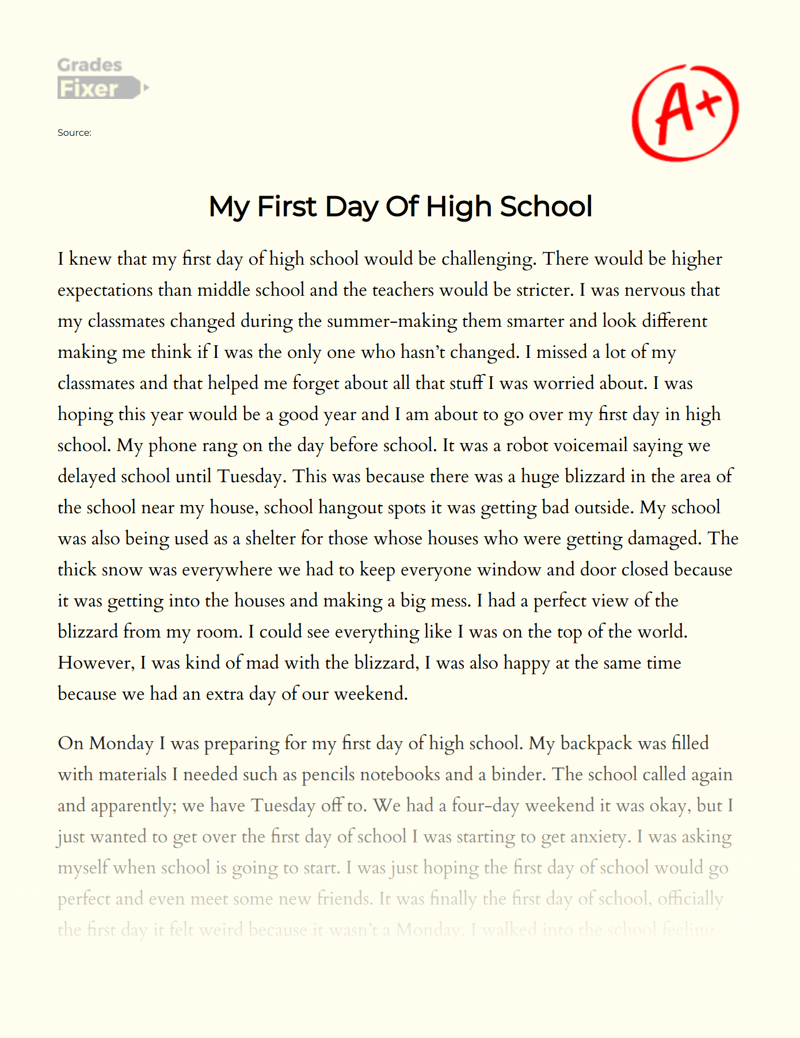
Still can’t find what you need?
Browse our vast selection of original essay samples, each expertly formatted and styled
Related Essays on First Day of School
It was Saturday, a busy day for me, I got up earlier that ay so as to pack up luggage. It was a little confuse because I was going to travel somewhere I have never heard of before_Tamanart, a small village which is 80 km to [...]
Wake up! Wake up! The shrieking commands of my now irate mother abruptly awake me. As I strain to open my eyes, I am pierced by the fiery hot coals of the suns rays. I roll out of bed, only to hear more commands barked out by my [...]
Grade 8 year. It symbolizes the beginning of the end, but also the start of a new beginning. I woke up stretching over to switch off my buzzing alarm clock. It was my first day of grade 8, but it was also my last year before [...]
This study focused on the relationship that exists amongst the fields of education and economic growth in Pakistan in 1980- 2014 periods. As an equivalent result with the literature studies, the existence of a positive and [...]
Teachers reflect on the year and often redesign and perfect their teaching strategies and plans. In essence, they get back to the basics of what they believe is the best way to inspire learning in their students. In other words, [...]
“Education is the most powerful weapon you can use to change the world" one of Nelson Mandela's famous quotes and it portrays he firmly believed in education for the masses. He believed in the power of education that extends [...]
Related Topics
By clicking “Send”, you agree to our Terms of service and Privacy statement . We will occasionally send you account related emails.
Where do you want us to send this sample?
By clicking “Continue”, you agree to our terms of service and privacy policy.
Be careful. This essay is not unique
This essay was donated by a student and is likely to have been used and submitted before
Download this Sample
Free samples may contain mistakes and not unique parts
Sorry, we could not paraphrase this essay. Our professional writers can rewrite it and get you a unique paper.
Please check your inbox.
We can write you a custom essay that will follow your exact instructions and meet the deadlines. Let's fix your grades together!
Get Your Personalized Essay in 3 Hours or Less!
We use cookies to personalyze your web-site experience. By continuing we’ll assume you board with our cookie policy .
- Instructions Followed To The Letter
- Deadlines Met At Every Stage
- Unique And Plagiarism Free
Have a language expert improve your writing
Run a free plagiarism check in 10 minutes, generate accurate citations for free.
- Knowledge Base
- How to write an argumentative essay | Examples & tips
How to Write an Argumentative Essay | Examples & Tips
Published on July 24, 2020 by Jack Caulfield . Revised on July 23, 2023.
An argumentative essay expresses an extended argument for a particular thesis statement . The author takes a clearly defined stance on their subject and builds up an evidence-based case for it.
Instantly correct all language mistakes in your text
Upload your document to correct all your mistakes in minutes

Table of contents
When do you write an argumentative essay, approaches to argumentative essays, introducing your argument, the body: developing your argument, concluding your argument, other interesting articles, frequently asked questions about argumentative essays.
You might be assigned an argumentative essay as a writing exercise in high school or in a composition class. The prompt will often ask you to argue for one of two positions, and may include terms like “argue” or “argument.” It will frequently take the form of a question.
The prompt may also be more open-ended in terms of the possible arguments you could make.
Argumentative writing at college level
At university, the vast majority of essays or papers you write will involve some form of argumentation. For example, both rhetorical analysis and literary analysis essays involve making arguments about texts.
In this context, you won’t necessarily be told to write an argumentative essay—but making an evidence-based argument is an essential goal of most academic writing, and this should be your default approach unless you’re told otherwise.
Examples of argumentative essay prompts
At a university level, all the prompts below imply an argumentative essay as the appropriate response.
Your research should lead you to develop a specific position on the topic. The essay then argues for that position and aims to convince the reader by presenting your evidence, evaluation and analysis.
- Don’t just list all the effects you can think of.
- Do develop a focused argument about the overall effect and why it matters, backed up by evidence from sources.
- Don’t just provide a selection of data on the measures’ effectiveness.
- Do build up your own argument about which kinds of measures have been most or least effective, and why.
- Don’t just analyze a random selection of doppelgänger characters.
- Do form an argument about specific texts, comparing and contrasting how they express their thematic concerns through doppelgänger characters.
Receive feedback on language, structure, and formatting
Professional editors proofread and edit your paper by focusing on:
- Academic style
- Vague sentences
- Style consistency
See an example

An argumentative essay should be objective in its approach; your arguments should rely on logic and evidence, not on exaggeration or appeals to emotion.
There are many possible approaches to argumentative essays, but there are two common models that can help you start outlining your arguments: The Toulmin model and the Rogerian model.
Toulmin arguments
The Toulmin model consists of four steps, which may be repeated as many times as necessary for the argument:
- Make a claim
- Provide the grounds (evidence) for the claim
- Explain the warrant (how the grounds support the claim)
- Discuss possible rebuttals to the claim, identifying the limits of the argument and showing that you have considered alternative perspectives
The Toulmin model is a common approach in academic essays. You don’t have to use these specific terms (grounds, warrants, rebuttals), but establishing a clear connection between your claims and the evidence supporting them is crucial in an argumentative essay.
Say you’re making an argument about the effectiveness of workplace anti-discrimination measures. You might:
- Claim that unconscious bias training does not have the desired results, and resources would be better spent on other approaches
- Cite data to support your claim
- Explain how the data indicates that the method is ineffective
- Anticipate objections to your claim based on other data, indicating whether these objections are valid, and if not, why not.
Rogerian arguments
The Rogerian model also consists of four steps you might repeat throughout your essay:
- Discuss what the opposing position gets right and why people might hold this position
- Highlight the problems with this position
- Present your own position , showing how it addresses these problems
- Suggest a possible compromise —what elements of your position would proponents of the opposing position benefit from adopting?
This model builds up a clear picture of both sides of an argument and seeks a compromise. It is particularly useful when people tend to disagree strongly on the issue discussed, allowing you to approach opposing arguments in good faith.
Say you want to argue that the internet has had a positive impact on education. You might:
- Acknowledge that students rely too much on websites like Wikipedia
- Argue that teachers view Wikipedia as more unreliable than it really is
- Suggest that Wikipedia’s system of citations can actually teach students about referencing
- Suggest critical engagement with Wikipedia as a possible assignment for teachers who are skeptical of its usefulness.
You don’t necessarily have to pick one of these models—you may even use elements of both in different parts of your essay—but it’s worth considering them if you struggle to structure your arguments.
Regardless of which approach you take, your essay should always be structured using an introduction , a body , and a conclusion .
Like other academic essays, an argumentative essay begins with an introduction . The introduction serves to capture the reader’s interest, provide background information, present your thesis statement , and (in longer essays) to summarize the structure of the body.
Hover over different parts of the example below to see how a typical introduction works.
The spread of the internet has had a world-changing effect, not least on the world of education. The use of the internet in academic contexts is on the rise, and its role in learning is hotly debated. For many teachers who did not grow up with this technology, its effects seem alarming and potentially harmful. This concern, while understandable, is misguided. The negatives of internet use are outweighed by its critical benefits for students and educators—as a uniquely comprehensive and accessible information source; a means of exposure to and engagement with different perspectives; and a highly flexible learning environment.
The body of an argumentative essay is where you develop your arguments in detail. Here you’ll present evidence, analysis, and reasoning to convince the reader that your thesis statement is true.
In the standard five-paragraph format for short essays, the body takes up three of your five paragraphs. In longer essays, it will be more paragraphs, and might be divided into sections with headings.
Each paragraph covers its own topic, introduced with a topic sentence . Each of these topics must contribute to your overall argument; don’t include irrelevant information.
This example paragraph takes a Rogerian approach: It first acknowledges the merits of the opposing position and then highlights problems with that position.
Hover over different parts of the example to see how a body paragraph is constructed.
A common frustration for teachers is students’ use of Wikipedia as a source in their writing. Its prevalence among students is not exaggerated; a survey found that the vast majority of the students surveyed used Wikipedia (Head & Eisenberg, 2010). An article in The Guardian stresses a common objection to its use: “a reliance on Wikipedia can discourage students from engaging with genuine academic writing” (Coomer, 2013). Teachers are clearly not mistaken in viewing Wikipedia usage as ubiquitous among their students; but the claim that it discourages engagement with academic sources requires further investigation. This point is treated as self-evident by many teachers, but Wikipedia itself explicitly encourages students to look into other sources. Its articles often provide references to academic publications and include warning notes where citations are missing; the site’s own guidelines for research make clear that it should be used as a starting point, emphasizing that users should always “read the references and check whether they really do support what the article says” (“Wikipedia:Researching with Wikipedia,” 2020). Indeed, for many students, Wikipedia is their first encounter with the concepts of citation and referencing. The use of Wikipedia therefore has a positive side that merits deeper consideration than it often receives.
Prevent plagiarism. Run a free check.
An argumentative essay ends with a conclusion that summarizes and reflects on the arguments made in the body.
No new arguments or evidence appear here, but in longer essays you may discuss the strengths and weaknesses of your argument and suggest topics for future research. In all conclusions, you should stress the relevance and importance of your argument.
Hover over the following example to see the typical elements of a conclusion.
The internet has had a major positive impact on the world of education; occasional pitfalls aside, its value is evident in numerous applications. The future of teaching lies in the possibilities the internet opens up for communication, research, and interactivity. As the popularity of distance learning shows, students value the flexibility and accessibility offered by digital education, and educators should fully embrace these advantages. The internet’s dangers, real and imaginary, have been documented exhaustively by skeptics, but the internet is here to stay; it is time to focus seriously on its potential for good.
If you want to know more about AI tools , college essays , or fallacies make sure to check out some of our other articles with explanations and examples or go directly to our tools!
- Ad hominem fallacy
- Post hoc fallacy
- Appeal to authority fallacy
- False cause fallacy
- Sunk cost fallacy
College essays
- Choosing Essay Topic
- Write a College Essay
- Write a Diversity Essay
- College Essay Format & Structure
- Comparing and Contrasting in an Essay
(AI) Tools
- Grammar Checker
- Paraphrasing Tool
- Text Summarizer
- AI Detector
- Plagiarism Checker
- Citation Generator
An argumentative essay tends to be a longer essay involving independent research, and aims to make an original argument about a topic. Its thesis statement makes a contentious claim that must be supported in an objective, evidence-based way.
An expository essay also aims to be objective, but it doesn’t have to make an original argument. Rather, it aims to explain something (e.g., a process or idea) in a clear, concise way. Expository essays are often shorter assignments and rely less on research.
At college level, you must properly cite your sources in all essays , research papers , and other academic texts (except exams and in-class exercises).
Add a citation whenever you quote , paraphrase , or summarize information or ideas from a source. You should also give full source details in a bibliography or reference list at the end of your text.
The exact format of your citations depends on which citation style you are instructed to use. The most common styles are APA , MLA , and Chicago .
The majority of the essays written at university are some sort of argumentative essay . Unless otherwise specified, you can assume that the goal of any essay you’re asked to write is argumentative: To convince the reader of your position using evidence and reasoning.
In composition classes you might be given assignments that specifically test your ability to write an argumentative essay. Look out for prompts including instructions like “argue,” “assess,” or “discuss” to see if this is the goal.
Cite this Scribbr article
If you want to cite this source, you can copy and paste the citation or click the “Cite this Scribbr article” button to automatically add the citation to our free Citation Generator.
Caulfield, J. (2023, July 23). How to Write an Argumentative Essay | Examples & Tips. Scribbr. Retrieved April 1, 2024, from https://www.scribbr.com/academic-essay/argumentative-essay/
Is this article helpful?

Jack Caulfield
Other students also liked, how to write a thesis statement | 4 steps & examples, how to write topic sentences | 4 steps, examples & purpose, how to write an expository essay, what is your plagiarism score.
WELCOME TO THE FAMILY! Please check your email for confirmation from us.
Sob stories? Trauma dumps? Black kids worry about writing college essays after affirmative action ban
When the Supreme Court ended affirmative action in higher education, it left the college essay as one of few places where race can play a role in admissions decisions.
- Share on Facebook
- Share on Twitter
- Share via Email
- Copy Link Link Copied
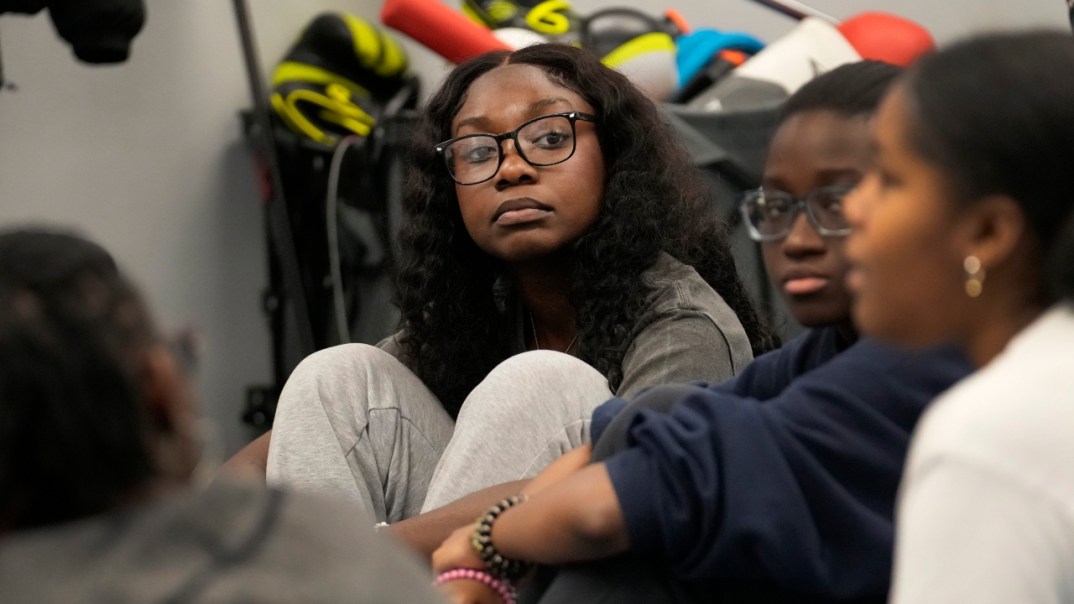
CHICAGO (AP) — When she started writing her college essay, Hillary Amofa told the story she thought admissions offices wanted to hear. About being the daughter of immigrants from Ghana and growing up in a small apartment in Chicago. About hardship and struggle.
Then she deleted it all.
“I would just find myself kind of trauma-dumping,” said the 18-year-old senior at Lincoln Park High School in Chicago. “And I’m just like, this doesn’t really say anything about me as a person.”
When the Supreme Court ended affirmative action in higher education , it left the college essay as one of few places where race can play a role in admissions decisions. For many students of color, instantly more was riding on the already high-stakes writing assignment. Some say they felt pressure to exploit their hardships as they competed for a spot on campus.
Amofa was just starting to think about her essay when the court issued its decision, and it left her with a wave of questions. Could she still write about her race? Could she be penalized for it? She wanted to tell colleges about her heritage but she didn’t want to be defined by it.
In English class, Amofa and her classmates read sample essays that all seemed to focus on some trauma or hardship. It left her with the impression she had to write about her life’s hardest moments to show how far she’d come. But she and some of her classmates wondered if their lives had been hard enough to catch the attention of admissions offices.
“For a lot of students, there’s a feeling of, like, having to go through something so horrible to feel worthy of going to school, which is kind of sad,” said Amofa, the daughter of a hospital technician and an Uber driver.
This year’s senior class is the first in decades to navigate college admissions without affirmative action. The Supreme Court upheld the practice in decisions going back to the 1970s, but this court’s conservative supermajority found it is unconstitutional for colleges to give students extra weight because of their race alone.
Still, the decision left room for race to play an indirect role: Chief Justice John Roberts wrote universities can still consider how an applicant’s life was shaped by their race, “so long as that discussion is concretely tied to a quality of character or unique ability.”
“A benefit to a student who overcame racial discrimination, for example, must be tied to that student’s courage and determination,” he wrote.
Scores of colleges responded with new essay prompts asking about students’ backgrounds. Brown University asked applicants how “an aspect of your growing up has inspired or challenged you.” Rice University asked students how their perspectives were shaped by their “background, experiences, upbringing, and/or racial identity.”
Wondering if schools ‘expect a sob story’
When Darrian Merritt started writing his essay, he knew the stakes were higher than ever because of the court’s decision. His first instinct was to write about events that led to him going to live with his grandmother as a child.
Those were painful memories, but he thought they might play well at schools like Yale, Stanford and Vanderbilt.
“I feel like the admissions committee might expect a sob story or a tragic story,” said Merritt, a senior in Cleveland. “And if you don’t provide that, then maybe they’re not going to feel like you went through enough to deserve having a spot at the university. I wrestled with that a lot.”
He wrote drafts focusing on his childhood, but it never amounted to more than a collection of memories. Eventually he abandoned the idea and aimed for an essay that would stand out for its positivity.
Merritt wrote about a summer camp where he started to feel more comfortable in his own skin. He described embracing his personality and defying his tendency to please others. The essay had humor — it centered on a water gun fight where he had victory in sight but, in a comedic twist, slipped and fell. But the essay also reflects on his feelings of not being “Black enough” and getting made fun of for listening to “white people music.”
“I was like, ‘OK, I’m going to write this for me, and we’re just going to see how it goes,’” he said. “It just felt real, and it felt like an honest story.”
The essay describes a breakthrough as he learned “to take ownership of myself and my future by sharing my true personality with the people I encounter. … I realized that the first chapter of my own story had just been written.”
A ruling prompts pivots on essay topics
Like many students, Max Decker of Portland, Oregon, had drafted a college essay on one topic, only to change direction after the Supreme Court ruling in June.
Decker initially wrote about his love for video games. In a childhood surrounded by constant change, navigating his parents’ divorce, the games he took from place to place on his Nintendo DS were a source of comfort.
But the essay he submitted to colleges focused on the community he found through Word is Bond, a leadership group for young Black men in Portland.
As the only biracial, Jewish kid with divorced parents in a predominantly white, Christian community, Decker wrote he constantly felt like the odd one out. On a trip with Word is Bond to Capitol Hill, he and friends who looked just like him shook hands with lawmakers. The experience, he wrote, changed how he saw himself.
Recommended Stories

Ahmaud Arbery’s killers seeking to overturn their hate crime convictions
Associated Press

High school teacher and students sue over Arkansas’ ban on critical race theory

House Republicans aim to strip funding from medical schools over diversity programs
Ashlee Banks

DEI programs and concepts that could make someone feel guilty about their race banned in Alabama

America’s youngest teacher is a 16-year-old MBA student
TheGrio Lifestyle

MF Doom and Madlib’s ‘Madvillainy’ — now 20 years old — is the timeless classic album we all thought it would be in 2004
Panama Jackson

Before heading ‘outside,’ spring-clean your finances in 4 steps
Jennifer Streaks
“It’s because I’m different that I provide something precious to the world, not the other way around,” he wrote.
As a first-generation college student, Decker thought about the subtle ways his peers seemed to know more about navigating the admissions process. They made sure to get into advanced classes at the start of high school, and they knew how to secure glowing letters of recommendation.
If writing about race would give him a slight edge and show admissions officers a fuller picture of his achievements, he wanted to take that small advantage.
His first memory about race, Decker said, was when he went to get a haircut in elementary school and the barber made rude comments about his curly hair. Until recently, the insecurity that moment created led him to keep his hair buzzed short.
Through Word is Bond, Decker said he found a space to explore his identity as a Black man. It was one of the first times he was surrounded by Black peers and saw Black role models. It filled him with a sense of pride in his identity. No more buzzcut.
The pressure to write about race involved a tradeoff with other important things in his life, Decker said. That included his passion for journalism, like the piece he wrote on efforts to revive a once-thriving Black neighborhood in Portland. In the end, he squeezed in 100 characters about his journalism under the application’s activities section.
“My final essay, it felt true to myself. But the difference between that and my other essay was the fact that it wasn’t the truth that I necessarily wanted to share,” said Decker, whose top college choice is Tulane, in New Orleans, because of the region’s diversity. “It felt like I just had to limit the truth I was sharing to what I feel like the world is expecting of me.”
Spelling out the impact of race
Before the Supreme Court ruling, it seemed a given to Imani Laird that colleges would consider the ways that race had touched her life. But now, she felt like she had to spell it out.
As she started her essay, she reflected on how she had faced bias or felt overlooked as a Black student in predominantly white spaces.
There was the year in math class when the teacher kept calling her by the name of another Black student. There were the comments that she’d have an easier time getting into college because she was Black.
“I didn’t have it easier because of my race,” said Laird, a senior at Newton South High School in the Boston suburbs who was accepted at Wellesley and Howard University , and is waiting to hear from several Ivy League colleges. “I had stuff I had to overcome.”

In her final essays, she wrote about her grandfather, who served in the military but was denied access to GI Bill benefits because of his race.
She described how discrimination fueled her ambition to excel and pursue a career in public policy.
“So, I never settled for mediocrity,” she wrote. “Regardless of the subject, my goal in class was not just to participate but to excel. Beyond academics, I wanted to excel while remembering what started this motivation in the first place.”
Will schools lose racial diversity?
Amofa used to think affirmative action was only a factor at schools like Harvard and Yale. After the court’s ruling, she was surprised to find that race was taken into account even at some public universities she was applying to.
Now, without affirmative action, she wondered if mostly white schools will become even whiter.
It’s been on her mind as she chooses between Indiana University and the University of Dayton, both of which have relatively few Black students. When she was one of the only Black students in her grade school, she could fall back on her family and Ghanaian friends at church. At college, she worries about loneliness.
“That’s what I’m nervous about,” she said. “Going and just feeling so isolated, even though I’m constantly around people.”
The first drafts of her essay focused on growing up in a low-income family, sharing a bedroom with her brother and grandmother. But it didn’t tell colleges about who she is now, she said.
Her final essay tells how she came to embrace her natural hair. She wrote about going to a mostly white grade school where classmates made jokes about her afro. When her grandmother sent her back with braids or cornrows, they made fun of those too.
Over time, she ignored their insults and found beauty in the styles worn by women in her life. She now runs a business doing braids and other hairstyles in her neighborhood.
“I stopped seeing myself through the lens of the European traditional beauty standards and started seeing myself through the lens that I created,” Amofa wrote.
“Criticism will persist, but it loses its power when you know there’s a crown on your head!”
Never miss a beat: Get our daily stories straight to your inbox with theGrio’s newsletter.
- Share on Facebook Facebook
- Share on Twitter Twitter
- Share via Email Email
- Copy Link Copy Link Link Copied

STREAM FREE MOVIES, LIFESTYLE AND NEWS CONTENT ON OUR NEW APP

IMAGES
VIDEO
COMMENTS
Types of High School Essay. 1. Narrative Essay. Narrative essays tell a story from the writer's perspective, often highlighting a personal experience or event. The focus is on storytelling, including characters, a setting, and a plot, to engage readers emotionally.
Paragraph 1: Introduction (3-4 sentences) Engaging opening Establishes context (including author and title) The novel Speak, by Laurie Anderson, focuses on the inner life of Melinda, a ninth-grade student who starts high school utterly alone. Melinda is detached from everyone around her, including herself. She is an outcast,
Intro Paragraph Part 3: The Thesis. The final key part of how to write an intro paragraph is the thesis statement. The thesis statement is the backbone of your introduction: it conveys your argument or point of view on your topic in a clear, concise, and compelling way. The thesis is usually the last sentence of your intro paragraph.
Examples of Great Introductory Paragraphs. Grab your reader's attention with the first words. Introduction. ThoughtCo. By. Richard Nordquist. Updated on June 06, 2020. An introductory paragraph, as the opening of a conventional essay , composition, or report, is designed to grab people's attention. It informs readers about the topic and why ...
I could see the horizon again. 2. Narrative Essay. A narrative high school essay is similar to a descriptive essay but focuses more on the story description rather than object description. The story can be about a personal experience that the writer has had, an event, a story, an incident.
A good narrative essay will begin with an attention-grabbing opening line. But make sure to avoid common clichés, such as "It was the best of times, it was the worst of times.". Instead, come up with something original and specific to you and your situation. For example: "My pre-calc teacher was obsessed with circles.
The following ideas work well for compare-contrast essays. ( Find 80+ compare-contrast essay topics for all ages here.) Public and private schools. Capitalism vs. communism. Monarchy or democracy. Dogs vs. cats as pets. WeAreTeachers. Paper books or e-books. Two political candidates in a current race.
In high school, you may have to write many different types of essays to develop your writing skills. Academic essays at college level are usually argumentative : you develop a clear thesis about your topic and make a case for your position using evidence, analysis and interpretation.
1. Hook the readers with a relevant fact, quote, or question for the first sentence. An attention getter draws readers into your essay. Use a shocking statistic or a hypothetical question to get the reader thinking on your subject. Make sure not to use an attention getter unrelated to the topic of your essay.
Step 1: Hook your reader. Step 2: Give background information. Step 3: Present your thesis statement. Step 4: Map your essay's structure. Step 5: Check and revise. More examples of essay introductions. Other interesting articles. Frequently asked questions about the essay introduction.
On average, the body comprises 60-80% of your essay. For a high school essay, this could be just three paragraphs, but for a graduate school essay of 6,000 words, the body could take up 8-10 pages. Paragraph structure. To give your essay a clear structure, it is important to organize it into paragraphs. Each paragraph should be centered ...
A narrative essay is one of the most intimidating assignments you can be handed at any level of your education. Where you've previously written argumentative essays that make a point or analytic essays that dissect meaning, a narrative essay asks you to write what is effectively a story.. But unlike a simple work of creative fiction, your narrative essay must have a clear and concrete motif ...
An argumentative essay attempts to convince a reader to agree with a particular argument (the writer's thesis statement). The writer takes a firm stand one way or another on a topic and then uses hard evidence to support that stance. An argumentative essay seeks to prove to the reader that one argument —the writer's argument— is the ...
The first step before you write any high school essay is to determine which type of essay you are required to write. There are 5 common types of high school essays: Descriptive, Narrative, Expository, Argumentative, and Analytical.With descriptive and narrative essays, you will need to use creativity to paint a story about a personal experience or communicate a deeper meaning through using ...
You may want to share the following five steps with your class to teach them how to write this style of essay—and then use the 23 persuasive essay topics for high school students listed below to help them get started! 1. Choose a Clear Position. Before you begin writing and researching, choose the position you want to take.
The structure of your expository essay will vary according to the scope of your assignment and the demands of your topic. It's worthwhile to plan out your structure before you start, using an essay outline. A common structure for a short expository essay consists of five paragraphs: An introduction, three body paragraphs, and a conclusion.
About My First Day at High School. 1 page / 168 words. First day of school (essay) This is a 150-word essay about my first day at high school. The night before was filled with anxiety and excitement. As a student from a traditional Chinese background, I was used to following the norms and values of collectivism,...
Argumentative Essay Example 2. Malaria is an infectious disease caused by parasites that are transmitted to people through female Anopheles mosquitoes. Each year, over half a billion people will become infected with malaria, with roughly 80% of them living in Sub-Saharan Africa.
This argumentative article for students is a great model of opinion writing. Have students follow the development of the author's argument through their annotations while reading. This not only supports students reading comprehension, but it will also prepare them for Assessment Question 3, "How does Paragraph 7 develop the idea that mobile ...
This is a 150-word essay about my first day at high school. The night before was filled with anxiety and excitement. As a student from a traditional Chinese background, I was used to following the norms and values of collectivism, frugality, and humility. However, my new school environment would be completely different, filled with students who ...
You might be assigned an argumentative essay as a writing exercise in high school or in a composition class. The prompt will often ask you to argue for one of two positions, and may include terms like "argue" or "argument." ... This example paragraph takes a Rogerian approach: It first acknowledges the merits of the opposing position ...
The first drafts of her essay focused on growing up in a low-income family, sharing a bedroom with her brother and grandmother. But it didn't tell colleges about who she is now, she said.